 By Ray Rivers By Ray Rivers
August 15, 2015
BURLINGTON, ON.
When the UN adopted the Declaration on the Rights of Indigenous Peoples (UNDRIP), enshrining their minimal standards for the survival, dignity and well-being, in 2007, only four nations opposed its passage. These were the former British colonies of Canada, Australia, New Zealand and the USA. Canada’s minister of Indian Affairs at the time Chuck Strahl, argued: “By signing on, you default to this document by saying that the only rights in play here are the rights of First Nations. And, of course, in Canada, that’s inconsistent with our Constitution.”
 Yet Canadian aboriginal and government officials had been engaged in the development of this declaration since the 1970’s. Amnesty International, condemned the Conservative government’s position as they argued that the UNDRIP outlined minimum human rights standards, complementing rather than overriding existing rights. In fact, over a hundred Canadian lawyers and legal experts prepared an open letter outlining why the Canadian government’s claims were misleading. Yet Canadian aboriginal and government officials had been engaged in the development of this declaration since the 1970’s. Amnesty International, condemned the Conservative government’s position as they argued that the UNDRIP outlined minimum human rights standards, complementing rather than overriding existing rights. In fact, over a hundred Canadian lawyers and legal experts prepared an open letter outlining why the Canadian government’s claims were misleading.
And it was only three years later that all four of the dissenting nations reversed themselves and ratified the Declaration, though their support could best be described as qualified. Canada and Australia, in particular, referred to the Declaration as some kind of aspirational document meanwhile insisting that their governments were already in compliance. It is said that if you don’t know that a problem exists, you will never come to a resolution.
Article 3 of UNDRIP includes the right to “to freely determine their political status and freely pursue their economic, social and cultural development.” Now that is pretty meaty stuff and something very much at odds with the paternalism that has characterized aboriginal policy over the centuries. Canada’s approach has always been assimilation or directed isolation – you are one of us or you are on the reserve and will play according to our rules.
Yet, Canada is the nation of multiculturalism. We encourage new immigrants to share their history and lifestyles with the rest of us as we continue to build Canada. Why do we treat immigrants as equals and our aboriginals as mis-guided children? The purpose of the Indian Act, first enacted almost immediately after confederation, was to encourage aboriginals to discard their history and embrace ours; to give up their cultural heritage as if it were obviously inferior.
Of course it’s not just about attitude, though it is a great deal about attitude. There are these historical treaties, and the new ones in the works, that continue to drive that wedge between us and them, to perpetuate the divisions. The Indian ‘status’ is a virtual prison sentence for Canada’s original inhabitants, segregating them from the rest of us. Conferring special rights (e.g. tax free), ‘status’ has perpetuated the demand for a system which has failed to provide economic and social development, and the freedom it purports to offer.
Like a treadmill or vicious circle, aboriginals are trapped in a dependency on public largess and welfare. What, arguably, may have been well-intentioned aboriginal policy at one time in history has been shown to be demeaning and de-humanizing. And the courts have told us we can’t just tear up the treaties, and the Indian Act, and start again, despite the overwhelming logic which says that is exactly what we need to do.
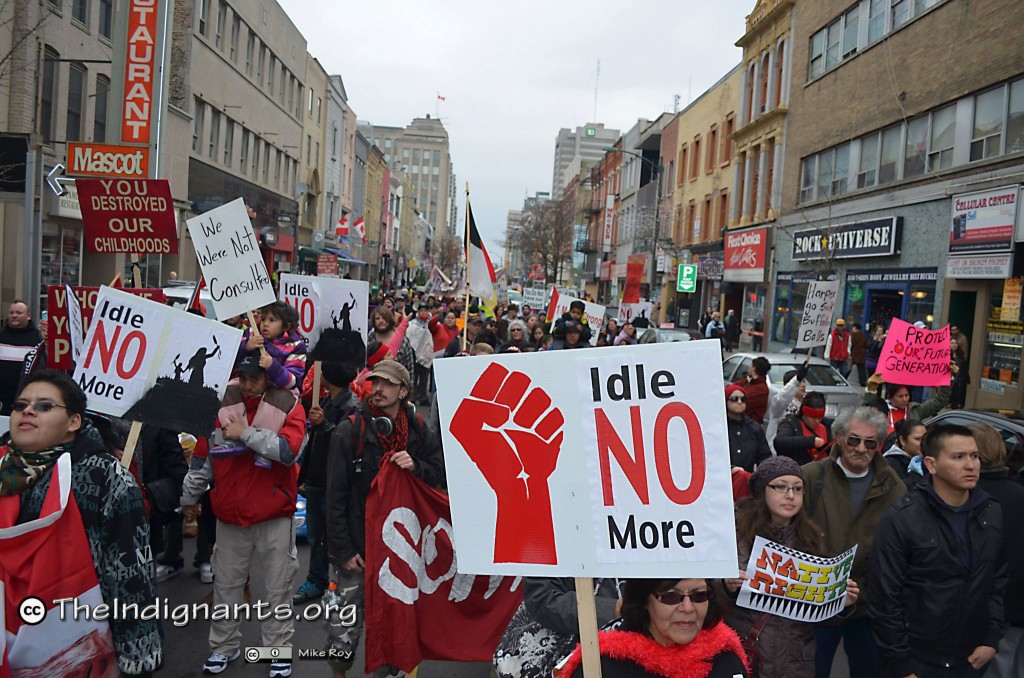 Pierre Trudeau, in 1969, and Stephen Harper, more recently, learned that change is not something government can do on its own, it needs to engage all Canadians in a serious discussion. Boundaries and limits, as articulated in the old treaties, can both protect and imprison. Would the creation of aboriginal nations within the Canadian nation be a solution? Doesn’t that already exist with the system of reserves? Would that have served to prevent the conflicts at Caledonia, Ipperwash, Akwesasne and ‘Idle No More’? Pierre Trudeau, in 1969, and Stephen Harper, more recently, learned that change is not something government can do on its own, it needs to engage all Canadians in a serious discussion. Boundaries and limits, as articulated in the old treaties, can both protect and imprison. Would the creation of aboriginal nations within the Canadian nation be a solution? Doesn’t that already exist with the system of reserves? Would that have served to prevent the conflicts at Caledonia, Ipperwash, Akwesasne and ‘Idle No More’?
The US government officially treats American tribes as ‘domestic dependent nations’ but has struggled in defining how these jurisdictions interact with federal, state, and tribal governments. It all sounds good until the rubber hits the road and everyone sees that this is nothing like the full sovereignty accorded foreign nations. The incident at Wounded Knee in 1973 exposed the limitations of the power of these Indian ‘nations’, when trying to exert some of the influence one would expect to have – as a nation. And that perhaps explains why those four former British colonies, unable to move beyond our 16th century First Nation’s policies, opposed the UN Declaration.
 There are no elegant solutions it seems, but the status quo is unsustainable, and we are not even talking about the real issues – the longer term place of aboriginals and their culture in Canada and among the rest of Canadians. We dance about, dealing with symptoms like the land claims or improving the education and health services on the reserves, as the Kelowna Accord was intended to do – good things nonetheless. And we pretend to worry about offending native culture, such as when a celebrity dons a warrior headdress, though like the feathered bonnet, so much of all of this is clouded in symbolism. There are no elegant solutions it seems, but the status quo is unsustainable, and we are not even talking about the real issues – the longer term place of aboriginals and their culture in Canada and among the rest of Canadians. We dance about, dealing with symptoms like the land claims or improving the education and health services on the reserves, as the Kelowna Accord was intended to do – good things nonetheless. And we pretend to worry about offending native culture, such as when a celebrity dons a warrior headdress, though like the feathered bonnet, so much of all of this is clouded in symbolism.
 Ray Rivers writes weekly on both federal and provincial politics, applying his more than 25 years as a federal bureaucrat to his thinking. Rivers was a candidate for provincial office in Burlington where he ran against Cam Jackson in 1995, the year Mike Harris and the Common Sense Revolution swept the province. Ray Rivers writes weekly on both federal and provincial politics, applying his more than 25 years as a federal bureaucrat to his thinking. Rivers was a candidate for provincial office in Burlington where he ran against Cam Jackson in 1995, the year Mike Harris and the Common Sense Revolution swept the province.
BACKGROUND LINKS:
UN Declaration Aboriginals Australia New Zealand USA
Indian Act Land Claims Indian Land Claims Conflict Assimilation

 By Ray Rivers By Ray Rivers
August 9, 2014
BURLINGTON, ON
My dad once gave me an Indian headdress he’d bought in northern Ontario. It was just a kid’s version, an imitation, and not very flowing – but he bought it at an Indian artifact shop and it was pretty special. It became a favourite when playing ‘cowboys and Indians’ back then, though I’m a little uncertain about the political correctness of any of that today.
 Prime Minister Stephen Harper wearing an Indian headdress. He has been a friend to the aboriginal community. In Canada our aboriginals face a host of issues such that a celebrity donning a piece of traditional tribal costume might hardly be worth a footnote in the list of society’s grievances. Life on the reserves is being challenged by recent changes the Harper government made to the environmental and fisheries habitat protection laws, in order to steamroll oil and gas pipelines over lands claimed by these first nations. And life for so many, on a number of the reserves, is barely habitable by most standards.
 In fact, Canada has been criticized by the UN for its aboriginal policies, and with some legitimacy. One needs to only look at incarceration rates in Saskatchewan and Manitoba to see that there are problems. And, then there are all the other issues: inferior education, missing women from reserves, violence, alcohol and drug abuse, increasing obesity rates and racial discrimination that still occurs in parts of the country. In fact, Canada has been criticized by the UN for its aboriginal policies, and with some legitimacy. One needs to only look at incarceration rates in Saskatchewan and Manitoba to see that there are problems. And, then there are all the other issues: inferior education, missing women from reserves, violence, alcohol and drug abuse, increasing obesity rates and racial discrimination that still occurs in parts of the country.
The root of all these problems lies with the Indian Act, Canada’s saddest piece of legislation. Back in its day (1876) Sir John A. MacDonald heralded the Act and its goal of fully assimilating Canada’s aboriginals. The purpose of the act was to administer Indian affairs in such a way that Indian people would feel compelled to renounce their Indian status, leave the reserves and join the rest of society as ordinary Canadians – a process called ‘enfranchisement’.
I don’t want to pick on Sir John A. or any of the other prime ministers. The problems really started with all the treaties that the British signed as a well-meaning alternative to wars and the ultimate extermination of the natives. King George III, yes, the mad English King who was also responsible for the loss of the thirteen American colonies, signed a well-meaning Royal Proclamation in 1763, promising all kinds of good things to aboriginals. This may have been an over-reaction to his failures with the American colonialists or part of a plan to get Canada’s natives on-side for the oncoming US revolutionary war.
There have been numerous amendments to the Indian Act, which have brought a modicum of enlightenment to the legislation, and even an attempt (Trudeau) to abolish the Act. But the courts have generally blocked these attempts, falling back on the legislation, the old treaties or the Bill and Charter of Rights. Abolishing the Indian Act would likely require constitutional changes, much like the Canadian Senate, and out of the purview of the courts.
 Suffice it to say that there have been some positive amendments to the Act over the years, allowing status Indians the right to vote and eliminating discrimination against women who choose to marry outside their tribe. The process of ‘enfranchisement’, or ‘civilizing’, which gave us the horrific experience of residential schools, has mostly been brought to an end. In addition there has been progress on land claims. This topic is a complex web of issues to unweave, so please stay tuned for another column. Suffice it to say that there have been some positive amendments to the Act over the years, allowing status Indians the right to vote and eliminating discrimination against women who choose to marry outside their tribe. The process of ‘enfranchisement’, or ‘civilizing’, which gave us the horrific experience of residential schools, has mostly been brought to an end. In addition there has been progress on land claims. This topic is a complex web of issues to unweave, so please stay tuned for another column.
In 2006 the Paul Martin minority government managed to get everybody, including the provinces, political parties and tribal organizations to achieve consensus on a program to improve the lives and standing of Canada’s aboriginals. In fact even after Martin’s government fell, and Harper became PM, the Kelowna Accord became law; though the delivery ended up being curtailed by the less-than-enthusiastic new PM (after all it wasn’t his invention). Still, Mr. Harper has come back to the spirit of Kelowna, more recently, introducing measures to improve aboriginal education.
Harper has also attempted, boldly, though unsuccessfully, to shift the ownership and full responsibility for the reserves from the Crown to the Indian tribes and their individual members. The notion was to empower aboriginals by privatizing the reserves’ land holdings and transitioning from the communal way in which bands now operate their activities on reserves. By ‘normalizing’ economic activities on reserves this might have been seen as just an alternate way of accomplishing the intent of the original Indian Act.
More recently however, the Harper government passed the ‘The First Nations Financial Transparency Act (FNFTA)’, requiring First Nations to disclose their financial statements and the salaries of band council officials. The argument is that this would provide greater transparency and allow band members to hold their leaders more accountable. Of course there were critics, as always, claiming that this was a higher standard than applied for most public officials.
But Harper had the angels on his side and scored an early win as the postings appeared on the government’s web site. In the tiny First Nation of Kwikwetlem (Coquitlam B.C.), with a band membership of 81, it turns out the contracted Chief, Ron Giesbrecht, got almost a million dollars remuneration from the band council. Apparently he was also the Director of Economic Development which earned him $80,000, plus ten percent of any business that came in. And an eight million dollars land settlement fell into his lap, giving him close to a million big ones, and tax free since he is a status Indian.
Initially the band council supported Giesbrecht, but that is an awful lot of money. The federal Minister of Aboriginal Affairs and Northern Development, Bernard Valcourt was outraged and other Canadians joined in the chorus of disapproval. Apparently his new contract with the band now excludes any provision for commissions. Nevertheless, Chief Giesbrecht would be a brave man should he decide to don a feathered bonnet at his band’s next festive occasion. That is unless he decides to give the money back to the band or donate it to some worthy cause. After all, as good a chief as he may be that is still a lot of money.
 Ray Rivers writes weekly on both federal and provincial politics, applying his more than 25 years as a federal bureaucrat to his thinking. Rivers was a candidate for provincial office in Burlington where he ran against Cam Jackson in 1995, the year Mike Harris and the Common Sense Revolution swept the province. Ray Rivers writes weekly on both federal and provincial politics, applying his more than 25 years as a federal bureaucrat to his thinking. Rivers was a candidate for provincial office in Burlington where he ran against Cam Jackson in 1995, the year Mike Harris and the Common Sense Revolution swept the province.
BACKGROUND LINKS
Headdress More Headdress Even More Headdress War Bonnet
Indian Act Kelowna Accord More Kelowna Accord Harper’s Plan Big Bonus
Transparency Act More Transparency Even More Transparency
Kwikwetlem

 By Carol Gottlob By Carol Gottlob
August 7, 2014
BURLINGTON, ON.
So the flood waters have subsided, and the issues surface….
The Corporation of the City of Burlington has, since the last election, spent a phenomenal amount of money on two new features of the city; the doomed pier and the Performing Arts Centre. I admit I didn’t pay much attention to the pier, until the crane toppled over and the bills started to pile up. Next, was the Performing Arts Centre, which I questioned, because we are already surrounded by performing arts centres in Oakville, another in Mississauga, Brampton, Guelph and Hamilton. Don’t get me wrong – I endorse art and culture, but this seemed like a bit of overkill to me.
The fact of the matter is, these now exist, and we live with them.
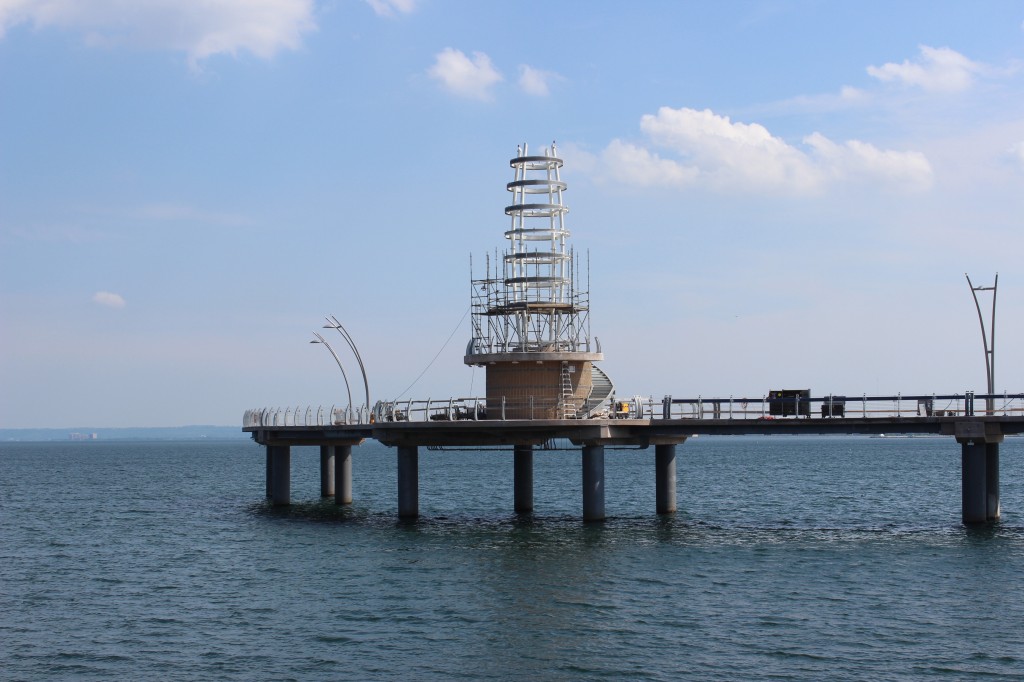 Is Burlington more than its over priced pier? Now, looking ahead, I feel it is time for “renewal”. It is time to look at what we already have, and where necessary, preserve, rebuild, enhance and protect it. The recent flood highlights exactly that need. Climate change is upon us. Floods, ice storms, hurricanes and tornados will become part of our existence on this planet and in this community. We will not be spared. So, let’s take a closer look at the infrastructure, and try to get ahead of the curve. We need to invest in fortifying our systems that we rely on, namely power, transportation and water. We need to protect the properties we call “home”. And this is where the story gets very real.
When the flood waters rose, I stood at the foot of my street and looked at the water rising on New St. I saw people wading through waist-high water carrying their belongings in green garbage bags. I offered help and saw many people doing likewise. Later, I walked over to my former neighbourhood, just south of New St. As I approached my old street, I could smell grilled meat on the bar-b-q. As I passed houses, I saw people inside eating, laughing and drinking wine. Meanwhile, a few steps further down the street toward Tuck Creek, lights were out, cars were floating, and people stood by looking on silently, exchanging almost whispered comments. It was surreal.
The next morning, I returned to pay a visit to former neighbours and dear friends, whose house was now a soggy shell, pumps gorging water back into the creek. Across the road, I saw an elder couple I’ve observed for years. They bought their house when it was built in the 60s and have kept it tidy and neat for all these years. Now they were standing outside, trying to understand how to put the pieces together again.
This is where we need to invest. In the properties that exist. The farmhouses that herald our rural traditions. The neighbourhoods that developers built, but people developed! The original telephone poles that adorn my street were installed in the 1950’s, when two wires were suspended – one for electricity, one for telephone. Now I look out, and I see 26 cables dangling from the equivalent of a toothpick! We need to fortify. We need to protect what we have. We need to help those who turned the houses into homes.
This recent event could aptly be called an emergency situation. Thankfully, no one was harmed, but the damage is severe and the long term impact is undeniable. And let us not be fooled; there will be more to contend with. It is imperative that the city and the council operate with a view to the near future and build reserves, provide contingencies and look after the needs of its citizens when disaster strikes.
Carol Gottlob is a candidate for the ward 4 council seat.

 By Ray Rivers By Ray Rivers
August 1, 2014
BURLINGTON, ON.
As a young man I couldn’t have cared less about pensions. I thought I’d live forever and probably die before I’d get a chance to retire. Many young people feel that way – planning for one’s old age is not a priority. And I had reason to hope my future had already been taken care of, because Canada had introduced its national pension plan only a few years earlier.
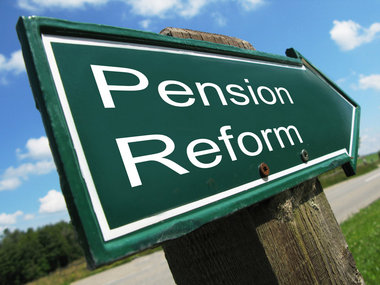 Where does the reform have to take place? In the minds of the citizens who do not seem to have been able to take personal responsibility for their own pension needs or at the government level where new ideas and new financial formats can be created to result in funds going into pension plans. Is this really a “mind” issue”? The plan was simple and the accounting straightforward. You pay in today and get your pension tomorrow. This was fine when so many were contributing and so few were receiving pensioners. But as the baby boomers started approaching retirement age and the liability growing, the plan had to be changed before it ran out of money.
So it fell to another federal government and finance minister Paul Martin, in the mid ’90’s, to transform the CPP into more of an investment fund, and place it on a sound financial footing. The long-term goal is to make CPP progressively more self-funding from contributions and investment earnings, rather than requiring one generation to pay for another’s pension.
The CPP is a mandatory pension scheme based on one’s lifetime earnings. But there are a full suite of other income sources for seniors to potentially access. The Old Age Security (OAS) program and the supplementary benefits provisions, originally introduce in 1952, is essentially a senior’s welfare fund which is means-tested to ensure the benefits go to those most in need.
There is the registered retirement savings plan (RRSP), a voluntary limited tax deferred system ; the relatively new voluntary interest tax-free saving accounts (TFSA); employer run private pension plans and, of course, one can always save for retirement from one’s after-tax income. Finally, the family home is a capital tax exempt asset should the retiree sell it and seniors with homes can get a reverse mortgage.
 Well it is because so many seniors end up retiring and dying in poverty. The CPP is currently paying an average of less than $7,000 a year. It fails to provide even a decent minimal level of income for retirement. And even with the OAS dollars thrown in, a pensioner would be living below the poverty line unless he/she had a company pension plan, RRSP, other savings or a house. Well it is because so many seniors end up retiring and dying in poverty. The CPP is currently paying an average of less than $7,000 a year. It fails to provide even a decent minimal level of income for retirement. And even with the OAS dollars thrown in, a pensioner would be living below the poverty line unless he/she had a company pension plan, RRSP, other savings or a house.
Bottom line is that the Ontario Retirement Pension Plan (ORPP) would level the playing field between those with an employer pension plan and those without, and that includes some expected three million Ontario workers. The program will be phased in to minimize the pain to employers, and once in place, those working for the public sector (including teachers and health care workers), large industrial organizations (auto workers) and large institutions (banks) will no longer be the only ones with a comfortable pension plan.
A sustainable retirement income may also reduce the number of Ontario claimants requiring supplementary benefits from the OAS. How ironic that a provincial pension program, heavily criticized by the federal government, ends up also reducing the federal deficit.
 The first pension plan for people was created by German Chancellor Otto on Bismark. 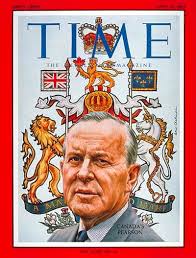 Liberal Prime Minister Lester Pearson was behind the move to provide comprehensive pensions Yet Ontario’s approach embraces a fundamental conservative philosophy, about people looking after themselves – paying their own way- rather than relying on government welfare to meet their living needs as seniors. Pensions are long term arrangements, and the federal government, like that young man or woman, just doesn’t want to make that a priority today.
Background links:
ORPP Canada Pension Plan
CPP and OAS Pensions Ontario Pension
More Ontario David Dodge
 Ray Rivers writes weekly on both federal and provincial politics, applying his more than 25 years as a federal bureaucrat to his thinking. Rivers was a candidate for provincial office in Burlington where he ran against Cam Jackson in 1995, the year Mike Harris and the Common Sense Revolution swept the province. Ray Rivers writes weekly on both federal and provincial politics, applying his more than 25 years as a federal bureaucrat to his thinking. Rivers was a candidate for provincial office in Burlington where he ran against Cam Jackson in 1995, the year Mike Harris and the Common Sense Revolution swept the province.

 By Ray Rivers By Ray Rivers
July 27, 2014
BURLINGTON, ON.
It sounds perverse perhaps, but this war against Russia may be the best thing for Ukraine. It has already succeeded in uniting a broken and divided nation. The western part wants to be part of the European Union (EU) community of nations and the eastern part, at least before the current occupation by terrorists, had wished they could back to the glorious old Soviet days. But as the conflict continues east and west are finding one common cause – a growing disdain for Russia.
Ukraine naively gave up its nuclear arsenal, the third largest in the world, to Russia in exchange for a treaty guaranteeing its security. Ukrainians must regret that decision now since Russia has broken its treaty commitment and invaded while the other signatories to the Budapest Memorandum washed their hands, as if their signatures meant nothing.
 There was a time when we saw Russian leader Putin as an ally – he is now being painted as a sinister and perhaps dangerous leader. Ukraine has long sampled all that Russia has to offer its satellites. Even after independence the country floated in the Russian orbit, putting off both EU and NATO memberships to avoid upsetting Mother Russia. But the example of a blossoming Poland, whose economy had rocketed following its EU membership, was just too hard to ignore for Ukrainians watching their economy decline in relative terms, and becoming one of the most corrupt places on the planet – even worse than Russia.
For all the respect world leaders accord the Russian Federation, its economy is smaller than Italy’s. Yet it punches above its weight on the global scene, given its historical place on the UN Security Council; its vast array of nuclear warheads, second only to the USA; and its huge land mass and natural resources therein. And, of course, it has sucked the EU into dependency on its natural gas, now so vital for their economies.
But Russia’s days as a fledgling democracy are over. Putin has jailed his political opponents. He has converted a once independent media into a smooth propaganda machine that turns out the facts the way he wants them to appear. No mistake about it, Putin has made the grade from elected President to virtual dictator. And true to form the downing of Malaysian jet liner by Russian insurgents in eastern Ukraine, using a Russian surface to air missile, likely co-ordinated by the Russian military is someone else’s fault.
So the alternate reality recently emanating from Russian media included a number of alternate theories, such as that dead bodies had been placed in the plane, a kind of ‘zombie’ vessel, and set to explode over rebel occupied territory to embarrass them, or that the Ukrainian air force had actually shot down the plane thinking it was Putin returning from Brazil.
Of course the west is partly to blame for this conflict – at least by how is has responded. NATO is in shambles, having been neglected for decades while member countries reducing their defense budgets every year. The pleas for more NATO support in the Baltic and south eastern member states have fallen on deaf ears as leaders reflect on what NATO was actually trying to accomplish in Afghanistan.
And Ukraine’s future EU partners are sleep walking, reticent to make Putin pay for his aggression and the disruption of a world order form which the Russian economy benefited so well – exports of natural gas for imported weapons to modernize Russia’s military.
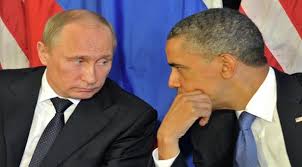 Is the future of the western world in the hands of these two men? It is not the west’s fault that the Ukrainian army was run into the ground over the last couple decades, nor that it has taken the nation this long to realize that a brighter future lies sleeping with the rest of Europe and not Russia. And it isn’t the west’s fault that Ukraine is on the cusp of bankruptcy as a result of corruption and its treasury having been plundered by the former president. But it is our fault that we have not reacted more quickly and more substantially. Doing so might have caught this current conflict in the bud.
The world order has changed again, though it seems only a few years ago that Russia was a partner rather than an enemy. Whether it is Putin’s unobtainable strategy, his ego or his disdain for the west, he has changed the way we will look at east-west relations for a long time. And even if Putin pulled back his mercenaries in Ukraine and stopped shelling their common border, he’d still have to explain the Malaysian air tragedy for which he bears ultimate responsibility. And after this is over Ukraine will have found its inner self and Russia, hopefully, found a new leader.
Corruption Airliner Shot Down Airliner Blame Game Putin The Nuclear Issue Russia Gone Rogue Propaganda Ukraine Conflict
Russian alternate Reality Canadian Support
 Ray Rivers writes weekly on both federal and provincial politics, applying his more than 25 years as a federal bureaucrat to his thinking. Rivers was a candidate for provincial office in Burlington where he ran against Cam Jackson in 1995, the year Mike Harris and the Common Sense Revolution swept the province. He developed the current policy process for the Ontario Liberal Party. Ray Rivers writes weekly on both federal and provincial politics, applying his more than 25 years as a federal bureaucrat to his thinking. Rivers was a candidate for provincial office in Burlington where he ran against Cam Jackson in 1995, the year Mike Harris and the Common Sense Revolution swept the province. He developed the current policy process for the Ontario Liberal Party.

 By Staff By Staff
July 11, 2014
BURLINGTON, ON
Ray Rivers, our lead columnist has done a column every week for the past 14 months. In each column he adds extensive background links for those who want to delve in the subject in more detail. Creating all those links is a chore but one we do willingly.
Rivers did a column on the new federal prostitution laws and expected more than the usual response he gets. Was it the subject or the summer? There is that wonderful British comedy: “No Sex please – we’re British” that just might apply to Burlington?
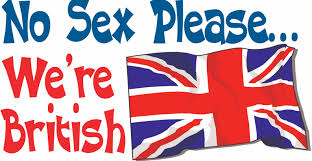 The British farce, which premiered in London’s West End on 3 June 1971, was unanimously panned by critics, but played to full houses until 1987. It did not share the same success with American audiences, running for only 16 performances on Broadway in early 1973. It did not run in Burlington. The British farce, which premiered in London’s West End on 3 June 1971, was unanimously panned by critics, but played to full houses until 1987. It did not share the same success with American audiences, running for only 16 performances on Broadway in early 1973. It did not run in Burlington.
Whatever – Rivers decided it was – we’ll let him tell his story in his own words: “I think I’ll just take a break for a couple weeks – I have had no responses to the last column – which I thought might have got some interest – It’s summertime and the readers are easy – the fish are jumping and the cotton is high….”
See you in a couple of week’s Ray.

 By Ray Rivers By Ray Rivers
July 9, 2014
BURLINGTON, ON.
As long as there are men and women – and money – prostitution, the world’s oldest profession, will be with us. Prostitution is legal in Canada, though some supporting activities aren’t, such as soliciting, operating a bawdy house and living off the avails. The Supreme Court last year determined these pesky laws could endanger prostitutes in the conduct of their business, violating their Charter rights, and so gave the government a year to fix them or they’d be history.
Canada’s justice minister, Peter MacKay, could have pulled a Kim Campbell and simply allowed the prostitution laws to fade away – as Campbell had done with abortion, thereby removing it from the criminal code. These prostitution laws are archaic, originating before confederation and based on the dated puritan ethics of the time. Aside from any question of morality there is no need to regulate the money for sex business at the federal level. Municipalities are best equipped to deal with zoning, traffic issues, licensing, and public health as they do for other businesses.
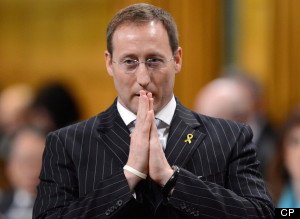 Justice Minister Peter McKay Nevertheless, Canada’s Justice Minister has decided what we need is more, not fewer laws. He is proposing to make buying sex illegal, ban advertising, and restrict selling sex to places free of minors. The only way sex workers will be able to conduct their trade is in back alleys, in customers’ cars and/or working through pimps. Instead of meeting his stated goal of eliminating prostitution this will just make it more victimizing, dangerous and unhealthy.
Prostitution is loosely defined as trading sex for some kind of payment. But defining payment and sex are problematic for an activity which comes in a variety of flavours, including males, females and everything in between. Coitus or intercourse may be what most people think of, but sex can be anything from oral to anal, sexual touching, just touching or even just talking.
Some ‘pros’ may see themselves as semi-professional sex therapists helping their clients with sexual problems, though don’t expect OHIP to pay for that service. And indeed, professional sex therapists do employ surrogates to provide sexual services.
And it really is about the money – money to live on. And if MacKay and Harper really wanted to do something significant to reduce the size of the industry they might start by ensuing all Canadians receive an adequate annual income. That way they wouldn’t have to resort to renting their bodies. Lifting the poverty level would remove the very reason that so many people turn tricks in the first place.
Legislating morality is a tricky business, especially in a multicultural Canada endowed with various religions, ethnic origins and cultural values. And societal values are constantly evolving as we shed the taboos of the past in favour of a broader enlightenment in this 21st century. Today there are a host of match-making, dating and even spouse-cheating services on-line and yet nobody talks about outlawing these businesses, which are really only a stone’s throw from what we call pimping.
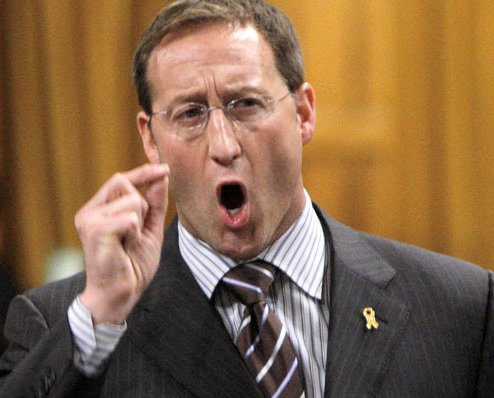 Mr. MacKay calls his new legal framework made-in-Canada, but it really just mimics the so-called Nordic model which most researchers on the topic admit is a hopeless failure at either eliminating prostitution or reducing potential violence. Mr. MacKay calls his new legal framework made-in-Canada, but it really just mimics the so-called Nordic model which most researchers on the topic admit is a hopeless failure at either eliminating prostitution or reducing potential violence.
Other jurisdictions, such as New Zealand, have effectively legalized (decriminalized) most aspects of prostitution making it safer for all parties involved in the business. And despite such liberalization of the oldest profession, evidence is that prostitution levels have not increased, as many feared they would. And they would know because sex workers there pay taxes on their earnings, unlike here.
If MacKay was really serious about what he calls victimization in the industry, the New Zealand model is what he should be looking at rather than that mixed bag he is bringing to the table – a mixed bag that the Supreme Court will once again rule against. And the moralistic Harper government will have to go back to the drawing boards to re frame the oldest profession.
And speaking of professions isn’t it time MacKay changed his or, rather, that his boss moved him into some other line of work. Almost every time this justice minister goes before the Supreme Court he loses his case – how on earth has he continued to hold his ministry with a record of incompetence like that.
If I were a PM that prides himself on being in control, I’d certainly want to change MacKay’s ministry if not his vocation. Come to think of it, he wasn’t much better as Minister of Defence either. Where is Kim Campbell when we need her?

Ray Rivers writes weekly on both federal and provincial politics, applying his more than 25 years as a federal bureaucrat to his thinking. Rivers was a candidate for provincial office in Burlington where he ran against Cam Jackson in 1995, the year Mike Harris and the Common Sense Revolution swept the province. He developed the current policy process for the Ontario Liberal Party.
Background links:
Prostitution Sex Workers The Wrong Way Flawed Information Street Walkers
International Statistics New Zealand Model New Zealand Harper’s Pitch
An Other View
Sex Surrogates – Nordic Model
What Sex Workers Say

 By Ray Rivers By Ray Rivers
July 3, 2104
BURLINGTON, ON.
If his father had spent more time teaching the son to horseback ride instead of to paddle a canoe, would Albertans have taken more kindly to Justin’s Liberals in Alberta’s two federal by-elections?
 Pierre never taught the kid how to ride a horse. Tough to win in Alberta without that skill. Provincial and federal politics are inextricably linked in Alberta. Though AT ONE POINT governed by the Liberals, the province has chosen other parties since the 1920’s, eventually carving out a reputation as Canada’s most conservative province.
Even before the senior Trudeau’s National Energy Program, essentially a federal tax on oil, served to alienate them, Albertans had mostly decided on the Progressive Conservatives (PC) or Social Credit, a sort of pre-Tea Party political entity that can best be described as conflicted. Edmonton, sometimes called ‘Redmonton’, has been known to have sent Liberals to Ottawa.
So, despite Liberal hopes for a break-through in oil-sand country, the Trudeau Liberals came up empty-handed, and Mr. Harper’s Conservatives won both Macleod (68.8%) and Fort McMurray- Athabasca (46.3%). The NDP were barely visible in either race, though they clearly hurt the Liberals in the northern Alberta poll. That contest between the two major parties would have been much less clear cut had a preferential ballot been used (see my last posting).
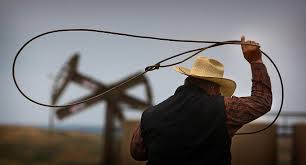 Oil and cowboys – two different demographics. But really low taxes in Alberta. The oil boom in northern Alberta has created a different demographic than that of cowboy country. If there is to be a Liberal or NDP breakthrough, other than cosmopolitan Edmonton, this is the most likely place for that to happen. Otherwise, the Conservatives (in one form or another) will continue to dominate the province. One might be excused for confusing Alberta politics with those of Cuba or even China. There too, the election results are forgone conclusions.
Ontario’s by-elections were a different story, with both wins going to the Trudeau Liberals, including Trinity-Spadina, which Layton’s widow, Olivia Chow, had vacated to run for the mayoralty in Toronto.
Ironically former Toronto Councillor Adam Vaughan ended up replacing her. This represents a significant loss for NDP leader Tom Mulcair, who was hoping to demonstrate national appeal beyond his powerful base in Quebec.
Liberal Arnold Chan cleaned up in Scarborough-Agincourt, in what had been promoted by the Tories as a test case of Trudeau’s marijuana legalization policy. Despite the aggressive Tory campaign on that issue, it appears the dopers were in the majority – or the voters just didn’t care about that issue. Will Mr. Harper finally get the message, one wonders?
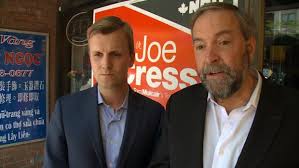 NDP took a huge hit in Ontario by elections. will the same thing happen with their big base in Quebec? By-elections are the best chance the public has to register discontent with a governing political party and its policies. This time around, nothing really changed in terms of the governing party. Liberals are playing well in Ontario but, despite their improved showing in Alberta, they have a long way to go before they can show results in the west. The by-elections indicate that Canadians may be drifting back to a two-party system with the NDP, Green, Libertarian and other parties safely in the back seat.
Quebec is still predominantly represented by the NDP, but will Quebecers shift back to their traditional first choice, the Liberals, if a Liberal government seems in the cards? Quebecers are perhaps the most strategic of Canadian voters, as they demonstrated in breaking tradition to help elect native son Brian Mulroney. They may just be parking their votes with the NDP.
One has to be careful in reading too much into these by-elections given that the PM deliberately called them on a summer-time Monday, the week school holidays started and the day before Canada Day. Why stick around to vote if you can head out to the cottage.
If Harper was hoping for low voter turnout to contain any damage, he got his wish. The best turnout was in Toronto (Scarborough-Agincourt at 27%) and the lowest in the tar sands (15%). In fact just 7% of eligible voters in Fort McMurray-Athabasca elected the MP there.

Ray Rivers writes weekly on both federal and provincial politics, applying his more than 25 years as a federal bureaucrat to his thinking. Rivers was a candidate for provincial office in Burlington where he ran against Cam Jackson in 1995, the year Mike Harris and the Common Sense Revolution swept the province. He developed the current policy process for the Ontario Liberal Party.
Background links:
Alberta General Elections By-election Results Chinese Politics By-elections

 By Pepper Parr By Pepper Parr
June 30, 2014
BURLINGTON, ON.
The Rural Burlington Greenbelt Coalition (RBGC) has created a web site to raise funds for what they are calling the Burlington Airpark SLAPP Suit Defense Fund.
A SLAPP Suit (Strategic Litigation Against Public Participation) is a merit-less legal action brought to intimidate opponents, deplete their resources, reduce their ability to participate in public affairs, and deter others from participating in discussion on matters of public interest.
We, the Burlington Gazette and me, Pepper Parr seem to be a part of it – but until a colleague told us about this fund raising web site – we knew nothing about it other than there were plans to put up a web site to solicit funds to help with the legal costs to defend ourselves against the law suit that has been filed against us by the Burlington Executive Air Park Inc.
Support is certainly going to be needed but this is not the way to get it.
First, the web site focuses on what it calls a SLAPP suit, unfortunately in law there is no such thing at this point in time. There should be such a thing but in a court of law what should be and what is – are two very, very different things. Judges go on evidence and precedent.
There is no SLAPP suit; there are no such things as SLAPP suits. The legal counsel representing Vanessa Warren and Monte Dennis have a vested interests in promoting legislation that would prevent SLAPP suits – and good on them. What they are advocating is necessary; should have been done years ago.
David Donnelly of Donnelly Environmental Law, and Brian MacLeod Rogers, a leading libel lawyer and member of the Attorney General’s Anti-SLAPP Advisory Panel have been advocating for SLAPP legislation for some time. Both will become specialists in this niche market and do some good work. We assume some of the funds donated will go to Donnelly and Rogers.
Rogers represents both Warren and Dennis. Parr and the Gazette have different legal counsel and a different legal strategy. The word SLAPP will never leave our lips in our defence arguemts.
What the Gazette, Parr, Warren and Monte are facing is a libel suit where the plaintiff is seeking $100,000 in exemplary damages from the three of us. It’s a significant case and only fools try to pretend the case is something other than what it is.
At some point there may be anti SLAPP legislation. But we do not have that now. What we do have now is a court case – and some financial support fighting that case would be welcome. But from the Gazette’s point of view, not under the terms and conditions the Rural Burlington Greenbelt Coalition is asking for donations.
The RBGC does not say what will be done with the funds; they do not say how any funds received will be distributed; they do not say they will be accountable to the donors and report on exactly where every nickel goes.
It is just a request for financial support – and I guess they are saying trust us. Neither the Gazette nor Pepper Parr will be accepting any funds you may choose to donate until there are solid rules in place for the accounting of funds.
It looks as if the funds are going to the RBGC – but that isn’t clear. Were it not for the fact that I know these people personally I would look upon this as one of the dozens of internet scams that show up in my email box every day.
I expect the highest possible level of transparency and accountability from the people mounting this fund raising campaign. The web site they have up right now is the equivalent of what a couple of high school students might do because they didn’t know any better.
RBGC should know better – the candidate for public office should know better; if this is the way Vanessa Warren is going to conduct herself as a member of city council – she will be worse than the incumbent. The city Clerk has a form available for those who feel they want to withdraw from the election.
The fund raising web site does an excellent job of setting out the problem and what the issues are about – they just lost their focus and are talking about something that doesn’t exist – yet.
The Rural Burlington Greenbelt Coalition fund raising web site .

 By Ray Rivers By Ray Rivers
June 29, 2014
BURLINGTON, ON.
Premier Wynne made a number of commitments during the recent Ontario election. Here are three more I think she needs to look at.
1: Improve Democracy
Traditionally the candidate with the highest number of electoral votes wins the election. This works well when there are only two political parties but not so well in our multiparty system. The last provincial election provides an example, where Kathleen Wynne’s Liberals won a majority government with 58 seats but with less than 40% of the vote. This vote splitting among the parties is pretty common place, as Stephen Harper and Jean Chretien also won majorities with less than 40% of the popular vote.
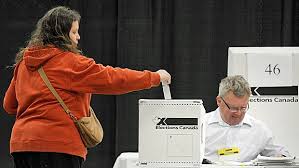 Is the way we count the ballots working for us? Some jurisdictions have introduced proportional representation, a complicated system engineered to moderate the political advantage of vote splitting. However, voters in referenda recently in B.C., as well as Ontario rejected a move to that system.
Another option involves use of a preferential ballot whereby voters rank their electoral choices in priority. If no candidate gets 51% of the total vote, then the second ballot choices are counted until someone wins, etc. The federal Liberals passed a motion at one of their policy conventions to introduce this system should they form government.
With preferential balloting the winning candidate will always have the support of over half of the voters as their first or second priority choice. There should be fewer minority governments as a result, since the impact of third parties in splitting votes will be diminished. And policies may tend to become more moderate as parties opt to please a broad swath of the public rather than just their own partisan base.
The province also needs to consider implementing electronic voting via the internet to encourage greater voter participation. Less than 60% turnout in a general election is unhealthy for a nation and province that prides itself on government by the people. Australia makes voting compulsory with legal penalties for failing to exercise your franchise.
Electronic voting should also reduce the the high cost of elections and facilitate quicker results. Finally, government may find it useful to include referenda questions on delicate issues as guidance in policy setting, a practice rarely used in Canada. And as for trust-worthy, well, we trust the internet for our banking, don’t we?.
2. Make Public Education Truly Public
There is a condition in the Canadian constitution, originating from the British North America Act of 1867, which enables provinces to retain Catholic schools as part of their educational system. That clause was added at the insistence of Quebec, which ironically has now eliminated its own Catholic schools, as indeed has Newfoundland.
Somehow when the political parties in the last election talked about cost cutting the elephant in the room was our redundant Catholic education system. Duplication at the board level, under-utilized classrooms in older areas, four school buses when there could be two – these are just the most glaring examples of waste.
 Is a separate and a public education system something Ontario can afford? Doesn’t exist in most of the other provinces. Public education is a great equalizer in our society. We may not all be born equal but the class room is a wonderful place for children coming from income, ethnic and religiously diverse households to grow together, better understanding each other and each other’s point of view. Hopefully that provides a formula for a more tolerant, understanding and competitive future for our youth.
3. Raise Taxes to Stem the Red
Ontario has the lowest cost-of-services delivery of any jurisdiction in Canada. Yet we are still running a deficit and our debt is piling up. It’s obvious we need to fix the revenue side of the balance sheet. And that means taxes.
There has been lot of talk about carbon taxes. B.C. and Quebec generate revenue in addition to encouraging energy conservation, though these taxes. In the case of B.C. the tax is revenue-neutral, offset by reductions in other taxes. And revenue neutral is not going to help us with the bottom line, is it?
Road tolls have also been bandied about and the 407, though being the greatest rip-off ever invented by man, is a system that works. Applying that formula to all divided highways and charging a reasonable toll would bring in a lot of revenue, in addition to helping the motorist better understand the value of the time they spend commuting.
 Are inheritance taxes something the government wants to bring back? Great cry from the wealthy if that ever happens. Is it time to bring back inheritance taxes? It’s not like the deceased will complain about paying death taxes. Why is it that we don’t tax lottery and gaming winnings as income?

Ray Rivers writes weekly on both federal and provincial politics, applying his more than 25 years as a federal bureaucrat to his thinking. Rivers was a candidate for provincial office in Burlington where he ran against Cam Jackson in 1995, the year Mike Harris and the Common Sense Revolution swept the province. He developed the current policy process for the Ontario Liberal Party.
Background links:
Catholic Schools More Schools Even More Schools Even More

 By Pepper Parr By Pepper Parr
June 26, 2014
BURLINGTON, ON.
Now that she is sworn in as the Member of the provincial legislature for Burlington, Eleanor McMahon can open her constituency office, get staff in place and be open for business locally. We look forward to hearing from her frequently and getting regular quarterly updates.
While getting the constituency office opened, Ms McMahon will also be getting her legislative agenda set up. We look forward to the day she gives her maiden speech.
All that stuff is in a day’s work – this Friday there is an evening’s fun to be had, as the Liberals gather somewhere in the city to hoot and holler; let their hair down and just have fun.
Had the Premier decided to make McMahon a Parliamentary assistant, we just might have seen McMahon dancing on the table tops.
The Liberals do have their work cut out for them. There is a public that remembers all too well, the profligate spending during the McGuinty era. One of their fears going into the election was that this pattern might continue.
There was a recent report on the way Premier Wynne handled the handing out of food cards, during the December ice storm. The process that was used proved to be less than effective. City of Toronto staff advised the Premier of several alternative approaches that could have been taken – the advice was apparently dismissed – rather quickly.
One can appreciate Wynne wanting to ensure that people had funds to buy food – putting a program like that in place was good public policy and also very good politics. That’s what the politicians are supposed to do – then they need to leave it to the bureaucrats to manage the program.
Premier Wynne needs to show the public that she is running a much more financially responsible government. She needs to not only be accountable, but to be seen to be accountable – and when someone screws up – and someone will – she needs to be decisive and direct in rooting out the problem.
Economic growth in both Quebec and Ontario are slower than the rest of Canada. Far more public money is spent in these two provinces than western Canada. The public needs to see benefits from that spending – and they need to see something soon.
The people of Ontario are generous; they believe that we need to take care of each other, to be considerate and compassionate – but realize that there is a financial score card that needs to be paid attention to.

 By Pepper Parr By Pepper Parr
June 22, 2014
BURLINGTON, ON.
When people hear what is happening it sounds like the kind of thing you hear about in some banana republic where the roots of a democracy have yet to firmly plant themselves.
A community faces a major issue with a large piece of property where they believe the owner of the property is breaking all the rules. They form an organization and take their case to city council. They contact local media and the story begins to unfold.
The community group delegates to both city council and Regional Council and in both instances make a strong case. The city does a little digging and quickly realizes there is a problem and begins to organize.
They find that the property owner is not cooperating and after a lot of huffing and puffing both sides end up in a court room.
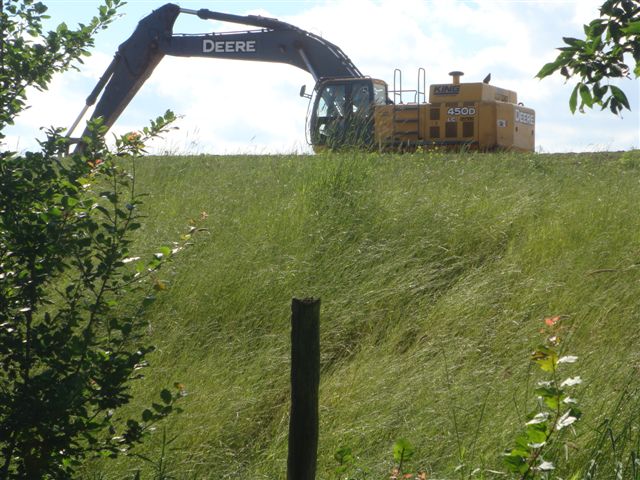 Placing this large hulking piece of equipment less than 20 yards from a property line is outright harassment. The landfill had already been placed on the property. The physical harassment has now been taken to a judicial level. The city wins its case. Justice John Murray finds that the Burlington Air Park must comply with the city’s site plan by law.
The Burlington Air Park decides to appeal the Justice Murray decision. The appeal court makes up its mind in less than half a day. The air park must comply.
Prior to the appeal, the Burlington Air Park serves Notices of Libel on two citizens and the Burlington Gazette. A Notice of Libel calls for the person that wrote something to retract what they wrote and apologize. Neither the Gazette or the two citizens, Monte Dennis and Vanessa Warren felt there was anything to apologize for.
Prior to the appeal court hearing all three: the Gazette, Dennis and Warren were served with Statements of Claim asking for $100,000 in exemplary damages.
Readers of the Gazette will know what we wrote. Key the words air park into the search engine on our web site and the more than 20 articles will appear.
Monte Dennis wrote a response to a Letter to the Editor that appeared in the Hamilton Spectator. This was a citizen doing what every citizen has a right to do. We note that the Burlington Air Park chose not to include the Hamilton Spectator in the claim for damages. Vanessa Warren wrote the following comment in the Gazette:
The Kovachik family opened the airpark in 1962, and for 44 years operated in harmony with its neighbours and its rural surroundings . You are not allowed to capitalize on that history. The history that you ‘re accountable for is amounting to an environmental disaster in our pristine protected countryside, and you may not manipulate that truth unchallenged anymore.
This is not an airpark improvement issue. This is a landfill issue, a water protection issue, a storm water management issue, a truck entrance and road use issue, and a property destruction and flooding issue.
Are we to celebrate that you ‘ve spent money to improve your for-profi t business? Who doesn ‘t do that? You say you ‘ve spent 4 million in improvements , but what about the income you ‘ve made from charging for untold hundreds of thousands of tons of unregulated fill? What about the protected watercourse you ‘ve destroyed? What about the regionally significant woodlot you gutted? The cost to the environment, the community and the City for your ‘improvements ‘ has been too high to bear.
Ask your immediate neighbours – none of whom have “recently purchased their homes” – bow things have improved for them? Flooded fields are unfarmable. Backyards and septic beds are underwater from silted run off. Sight lines and property enjoyment are destroyed. Anxiety about well water safety is high, and you will not permit the MOE to release on-site testing data. Writing that you ‘ve “always respected your neighbours .. .” is more than untrue; it’s cruel.
There are no unsubstantiated claims. Terrapex Environmental found unacceptably high levels of contaminants like hydrocarbons and heavy metals in the paltry 52 soil reports you were able to provide. Off-site water testing may be fine to date (again, where’s the data?), but how long might it tale for those contaminants to leach into wells?
The City of Burlington legally won the right to impose it’s Site Alteration Bylaw on airpark property , and yet you still will not comply. The community would truly love to know that your property is NOT full of contaminated fill – why don’t you give us the verified, third-party data to prove it?
We are all so weary of your attempts to manipulate . Standing up to you and stopping the trucks was never political, it was ethical, and you have no ethical credibility left.
Vanessa Warren
 Vanessa Warren, founder of the Rural Burlington Greenbelt Coalition chose to run for public office and represent ward 6 because she felt the community was not being well served by the incumbent. The owner of the land park is now uses the courts to silence her. What makes the claim against Vanessa Warren so serious is that she is a nominated candidate for the ward 6 council seat where the air park is located. One could take from the Burlington Air Park legal action that they do not want to see Vanessa Warren on city council.
In an Open Letter to city council the group that has been leading the fight against the air park, the Rural Burlington Greenbelt Coalition (RBGC) asked that the city “defend public engagement and public advocacy – the cornerstones of our democratic system – from the Burlington Airpark’s SLAPP suit, so that this type of legal coercion does not silence the citizens of Burlington.”
Prior to the provincial election there was a bill on the order paper calling for laws that would prevent what is being called Strategic Litigation Against Public Participation (SLAPP). It was a private members bill brought forward by the New Democratic Party that got all party approval but that bill died on the order paper when the election was called.
The RBGC hopes it can persuade the provincial government to pick up the bill and make it a priority. They would be delighted if the province moved real quick and then made any legislation retroactive.
The issue is serious, very serious. When people with significant funding at their disposal decide to use the power of a law suit to silence people who care about their community and are prepared to speak out publicly the courts should not be the place where these public issues get worked through.
The Burlington Air Park has paid more than $62,000 in court ordered costs – so the judiciary is doing its part.
What is profoundly disappointing is that the public has yet to hear anything from the Mayor of Burlington or the Regional Chair Gary Carr. These two men lead public opinion and they have in the past put their views forward on important issues. When the Mayor saw for the first time the damage done to the Sheldon property on Appleby Line by the air park landfill he was reported to have said he was appalled.
Disappointing too is the reaction from the private pilots who are seeing the airport they have used for years put at risk. The Gazette has talked to a number of these pilots – not one is prepared to say a word publicly. One exception is Andrew Forber who has commented on several occasions at some length.
Having people fear making public comments is a very unhealthy situation for any democratic society.
Much of the history of the struggle between good and evil is explained by philosopher Edmund Burke’s observation. Time and again those who profess to be good seem to clearly outnumber those who are evil, yet those who are evil seem to prevail far too often. Seldom is it the numbers that determine the outcome, but whether those who claim to be good men are willing to stand up and fight for what they know to be right.
City staff battle with the air park on an almost daily basis over the illegal use of gateways to the air park property and access to the site. Staff are focused and well led and they persevere – but we are hearing nothing from the people who are in a position to mold public opinion. Taking the position that they cannot comment on an ongoing court case is hiding behind skirts
The people of Burlington need to hear from the good people.

 By Ray Rivers By Ray Rivers
June 20, 2104
BURLINGTON, ON.
It has taken him six years to finally announce his first concrete action to combat global climate change and it’s still only a little – and a little late. US President Obama’s Environmental Protection Agency has imposed a 30% carbon emission reduction limit on US coal-powered electricity plants by 2030. That will mean scrapping some of the older plants and conversion of many others to natural gas. In addition to the greenhouse gas (GHG) reduction benefits, this will also mean 6600 fewer premature deaths and 150,000 fewer asthma cases, they estimate.
By comparison, Ontario which historically burned coal for up to a quarter of its electrical needs, including at the largest coal-fired plant of its time, had completely shut down and banned coal burning earlier this year. Ontario’s courageous action is Canada’s single most significant greenhouse gas (GHG) reduction ever.
 Smokes stacks like this one dotted the province of Ontario. The government put an end to coal fired electrical generation plants – and we all breath easier now. The federal government had never really been supportive and had refused to help Ontario with costs of this shift away from coal. Nevertheless, Mr. Harper was only too proud to point out that Canada was already ahead of the US in cleaning up its coal-burning emissions, when Obama challenged him to follow the US regulatory lead. Canada’s share of emissions from coal burning are now only about a third of the equivalent in the US. But unlike the US, our overall GHG emissions are heading skywards making a mockery of Canada’s official reduction targets.
In any case, Obama wasn’t talking about coal, when he challenged our PM, he was referring to our oil sands. The oil industry claims they can now extract a barrel of oil from the sand without having to burn another full barrel in the process, but mining the tar sands is still the most inefficient and environmentally destructive resource extraction anywhere.
So Obama had the Keystone XL pipeline clearly in his sights. Approving Keystone would just enable further expansion of the oil sands, something US environmentalists have been decrying. And since American dependence on Canadian oil is declining thanks to horizontal hydraulic fracturing (fracking) in the US, that Keystone project is looking less and less likely everyday.
Harper and Obama are on different wavelengths. That became clear as our leader joined with the new Australian PM, recently, promising to thwart carbon pricing and other global attempts to mitigate the effects of climate change, and to oppose efforts such as Obama’s press for climate change through forums like the G20. Why should we expect dinosaurs to care about fossil fuels?
And Canada isn’t about to be lectured by a lame-duck president. Mr. Harper has another plan to get the bitumen out of Alberta and into Chinese and other export markets – its called the Northern Gateway project. Northern Gateway is a pipeline from the tar sands across fragile B.C. terrain, over a thousand kilometres, and to the environmentally sensitive Pacific coast at Kitimat B.C. Northern Gateway was Harper’s baby form its inception, and just this week he employed the pretense of an energy board review before approving its construction, as everyone was fully predicting he would.
Many Canadians are still unsure about what this means, but not the opposition parties which are united in promising to stop this risky business. Some pundits think this project could become the PM’s final undoing, since he may lose the crucial support of B.C. voters in next year’s federal election.
The B.C. aboriginal communities, over whose land the pipeline will cross and whose fisheries on the coast would be devastated by the inevitable oil spill, are also unified in their opposition. And the B.C. government still has conditions and concerns ranging from its desire for compensation to better environmental safeguards, before it consents. The province does not want to end up saddled with the clean-up costs of any spills.
B.C. residents take their environmental stewardship seriously. For example, B.C. and Quebec are the only Canadian provinces with carbon taxes to reduce fossil fuel burning and GHG emissions. And the B.C. economy depends heavily on tourism and its fisheries, both of which are threatened by this project. How is it fair that Alberta gets the royalties while B.C. gets the risk?
 All he costs related to the transportation of oil through a pipeline have to be taken into account – is that happening? Early cost estimates of the project which would move the half-million or so barrels of diluted bitumen a day through the Northern Gateway and onto foreign tankers could easily approach twenty billion dollars. Even if the proponent is in the private sector, there are always federal and provincial subsidies and all the ancillary costs attached to these kinds of mega projects. One could buy a lot of renewable energy infrastructure for that kind of money. And damage to the environment from a leak or shipping accident would be… well… just priceless.

Ray Rivers writes weekly on both federal and provincial politics, applying his more than 25 years as a federal bureaucrat to his thinking. Rivers was a candidate for provincial office in Burlington where he ran against Cam Jackson in 1995, the year Mike Harris and the Common Sense Revolution swept the province. He developed the current policy process for the Ontario Liberal Party.
Background links:
Ontario Coal Phase-Out Obama’s Plan Implications for Canada Canada’s Response US Health Benefits Northern Gateway
Canada-Australia Coalition Oil Sands Emissions – B.C. Carbon Tax

Ju ne 20, 2014 ne 20, 2014
BURLINGTON, ON.
James Burchill is not big on bureaucracy. He doesn’t like getting tangled up on loose ends. Define the target, aim, pull the trigger tends to be the Burchill modus operandi. Here he gets on about having permission to email people.
By James Burchill
Quick everyone … July 1st is fast approaching and we need to ask everyone we can think of whether we have permission to email them in the future.
Are you freaking kidding me?
Way to go genius … that’s going to cost you dearly.
Why?
Because YOU DON’T NEED TO ASK NOW IF YOU”VE EMAILED THEM BEFORE.
Implied permission is still a legit way to connect via email UNTIL JULY 1st 2017 that’s 3 YEARS FROM NOW!
You’re basically going to burn your email list if you approach things this way. If you ask everyone in a frantic rush for permission you will get maybe 10% say yes. The rest WILL NOT.
This is not news … it’s typically been this way in the past. If you try and get a list to give you consent to sell them stuff – they usual say no … about 9 out of 10 people do anyway.
So stop with the knee-jerk reactions and think this through. Sure, the days of spamming people are over. Nope you can’t rent a list and sell stuff to them post July 1st without getting some grief … millions of it if you’re found wanting!
But, if you have a list and have been emailing it for a while and you have a pre-existing relationship with people that PRE-DATES July 1st then you have 3 MORE YEARS to move from IMPLIED CONSENT to EXPLICIT CONSENT.
And guess what … there are many wrinkles in the “law” that need ironing out before the REAL DROP DEAD DATE of JULY 1ST 2017.
You do not need to be scaring, spooking or generally giving your list the option to tell you to “go away!” … and if you keep asking them, well it serves you right because they will tell you to ***** off!
Stop being such a “fraidy-cat” and man-up. Email permission is getting a face lift for sure, and you should NOT SPAM PEOPLE but you certainly don’t need to commit email suicide either. Begin slowly converting the implied to the explicit by offering them a valuable report or “ethical bribe” that helps them solve a problem you’re in the market to remedy. Then you are totally on side with Bill C-28 and can email all you like.
Why the rant today? Well I’ve seen so many emails begging me for permission to stay connected … are you kidding me? Get real. This approach is wrong and frankly sends out the worst kind of desperate signals to people. So when I got yet another “whiny … please can we stay friends …” type email I lost it.
All ranting aside, seriously … stop shooting yourself in the foot. Work to convert (implied consent) people on your list by emailing them converting (explicit) offers … and USE THE NEXT 3 YEARS TO DO IT!
Again to be clear … you have 3 years to convert implicit to explicit permission and frankly if you can’t figure out a cool way to do that within your business sector … well I’d say maybe you don’t deserve an email list.

James Burchill runs the Burlington Social Fusion Network that meets regularly at the Ivy Bar and Kitchen.

 By Pepper Parr By Pepper Parr
June 18, 2014
BURLINGTON, ON
A more than 70 year run came to an end when Burlington elected Liberal Eleanor McMahon as their MPP. It was a solid win and part of a Liberal red sweep through much of the region.
Halton went Liberal after 19 years of Tory blue.
It was clear that the people of the province in general weren’t buying the Progressive Conservative line that the province had to cut like crazy to get the deficit in line and that 1 million jobs were going to suddenly appear.
The province decided to opt for hope and the belief that Kathleen Wynne could work through the problems. This despite the mistakes that can fairly be described a gargantuan under Dalton McGuinty’s leadership.
 The Liberals found a candidate with both depth and an ability to connect with people. Wynne managed to convince the voters that there was a lot of waste but that there would not be that kind of waste on her watch. She asked the people of the province to trust her and enough of them to give Wynne a majority government decided to do just that.
One of our readers had this to say about the McMahon win:
Congratulations to Eleanor McMahon. Clearly, she ran an effective campaign and I’m sure she’s was a qualified candidate. I do, however, find it extremely disheartening that Burlington residents bought into Liberal scare tactics, and were so willing to reward eleven years of cronyism, scandal, reckless spending, debt accumulation, blatant lying, shameless pandering to unions, and incompetence with their vote. The party’s victory begs the question, exactly how bad does a government’s behaviour need to be before they get the boot?
I’m curious what Wynne’s excuse will be when the books aren’t balanced by 2017/18 as promised, but I have no doubt she’ll come up with something!
A few days before the election Ms. McMahon and the Burlington Liberals tweeted out something about how they’ll be investing in local businesses and entrepreneurs. I’m still waiting for an answer regarding the specifics of how that will work. I know the Ontario Liberals will be handing out BILLIONS to Cisco and tens of millions to Open Text, but I haven’t heard one word about how Kathleen Wynne’s Liberals will help Burlington businesses succeed. I’m quite certain they won’t let them succeed TOO much, as corporate taxes are almost certain to be raised, as will personal income taxes on reasonably successful entrepreneurs.
Good luck Ms. McMahon. Your government has its work cut out for it, and we’ll be watching.
Indeed all of the province will be watching – many wish there had been better watching when Dalton McGuinty was leading that party.
Did Eleanor McMahon win – or did Jane McKenna lose and how did these two woman come to be the candidate for their political party of choice.
We are told that Kathleen Wynne recruited McMahon directly; that they lunched in Burlington and Wynne asked McMahon to accept the nomination.
The political tradition of this province has been for the local political party association to find a candidate and present that name to the party for vetting. The late John Boich spent many hours grooming Brian Heagle to become the Liberal candidate only to have Heagle decide that he was more of a blue blood than a Liberal and he went after the Tory nomination. Poor Heagle found that his blood wasn’t good enough and he couldn’t get the nod he needed from the Burlington Progressive Conservative Association.
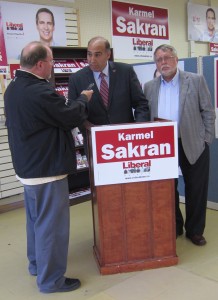 Karmel Sakran was selected by the Liberal riding association – not that it made a big enough difference. Boich convinced Karmel Sakran to run for office and he put up a good fight against a Tory who brought zilch to her nomination.
Jane McKenna was close to the last Tory nominated in the province in 2011 and despite no experience, other than a run against Rick Craven for the Ward 1 seat on city council – where she did very poorly, she had no experience.
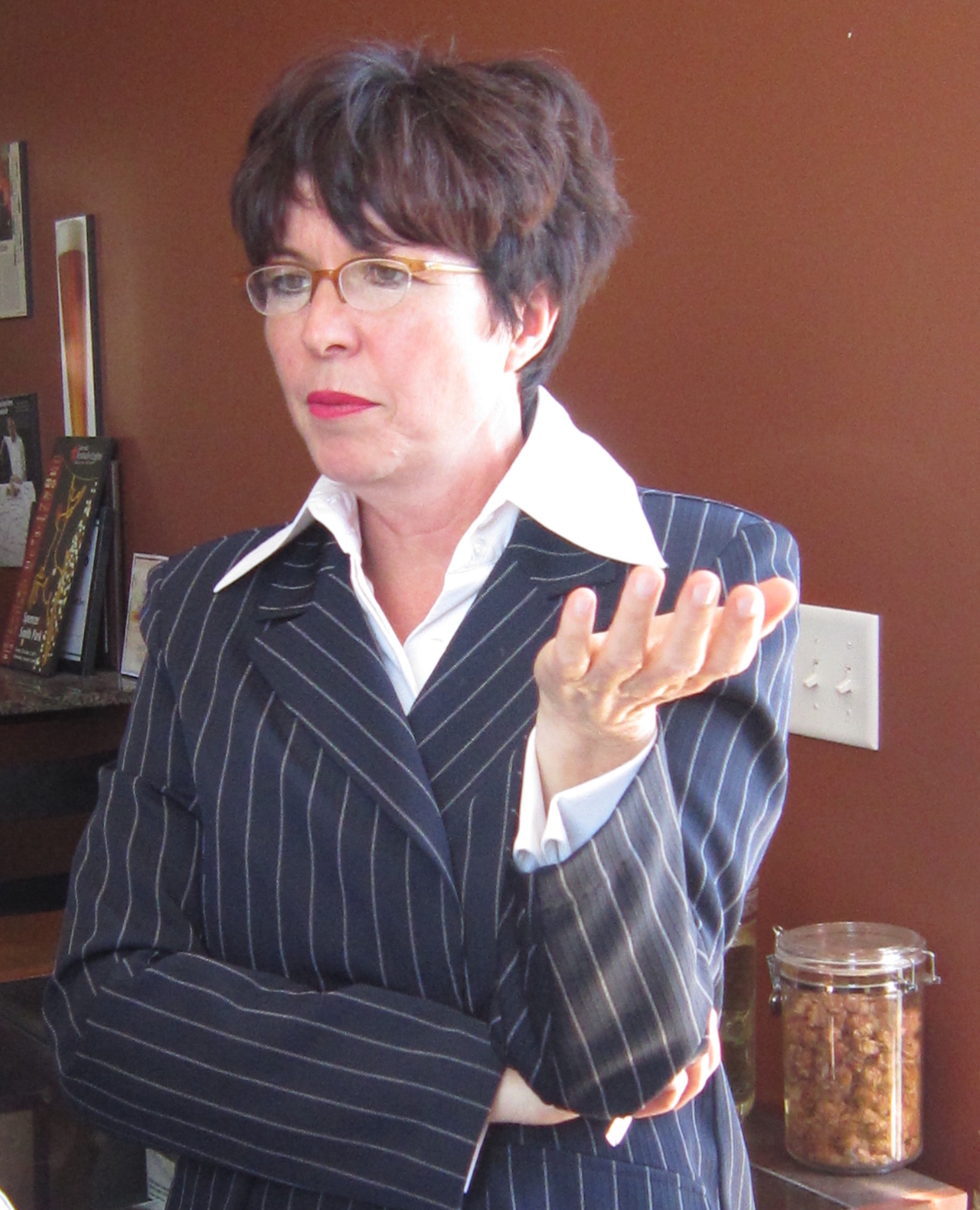 Turned out to take more than a good suit to convince the voters that you were able to do the job. She would appear at local events but never once made a delegation to city council where Councillor Craven remarked on the fact that the city had never heard from its MPP.
When Rick Wilson was doing great work to have a plaque placed on the waterfront that corrected the history surrounding what actually took place on our waterfront during the War of 1812 he found that he “blown off” by McKenna’s office when he put a call in to them for some help. At the time MP Mike Wallace was doing everything he could to get the plaque that is at Burlington Heights in Hamilton corrected but as Wallace said at the time: “it was a provincial matter and there wasn’t much I could do”.
The day the creation of the plaque was announced McKenna was on hand apologizing profusely to Wilson for the goof up at her office. Part of McKenna’s problem as an MPP was her inability to integrate into the community politically – she just didn’t have the experience and local Tory’s began to distance themselves from her.
You rarely saw Wallace and McKenna standing very close to each other when they were both at the same event.
There were serious problems with the local PC party association where it is reported the executive went through at least two changes. McKenna didn’t have good working relationships with her constituency executive. She had difficulty as well getting in on events when Cabinet ministers were in town.
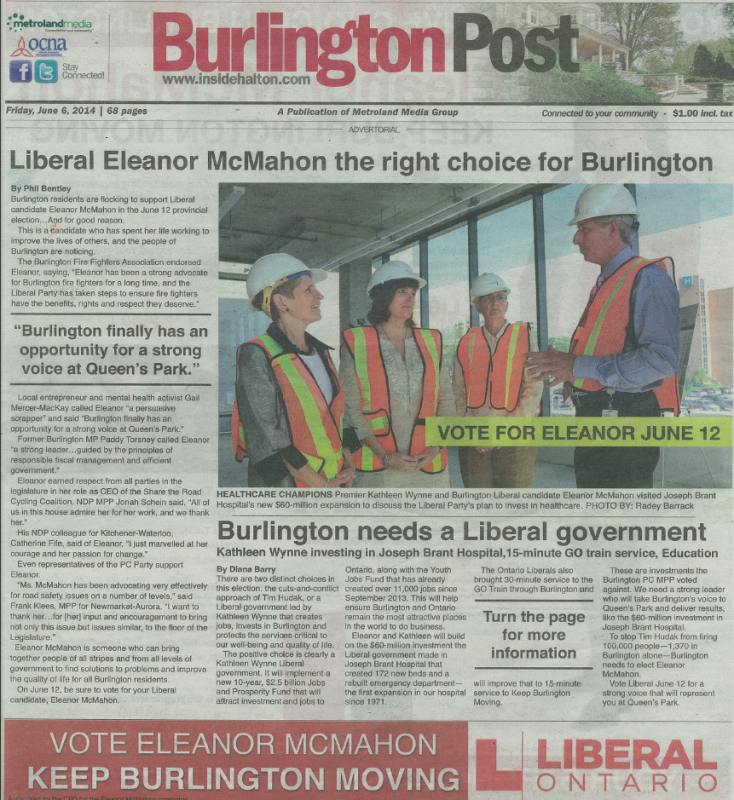 It was THE political coup of the provincial election when the Liberals managed to convince the Burlington Post to sell them a “mock” front page. Good for the revenue side of the business – but egg on the face editorially. The Post published a front page apology the following day. It happens. On one occasion when the city was officially opening the Community Garden in behind the Seniors’ Centre on New Street, McKenna wanted to be on hand and wasn’t able to get an official invite from the city. A polite call to the Mayor could have solved that problem. The Gazette wrote about the difficulty and advised McKenna on how she could have a presence at the event. At the time city hall talked the protocols they had to follow. It is an unhappy day when the political representative for a large number, probably a majority, of the people in the city cannot be at a socially and politically significant event. That was always McKenna’s dilemma.
The Burlington Progressive Conservative Association chose an unqualified person who was able to win the first time out because of the strength of the political base. The member was expected to perform and deliver for the community and that just didn’t happen.
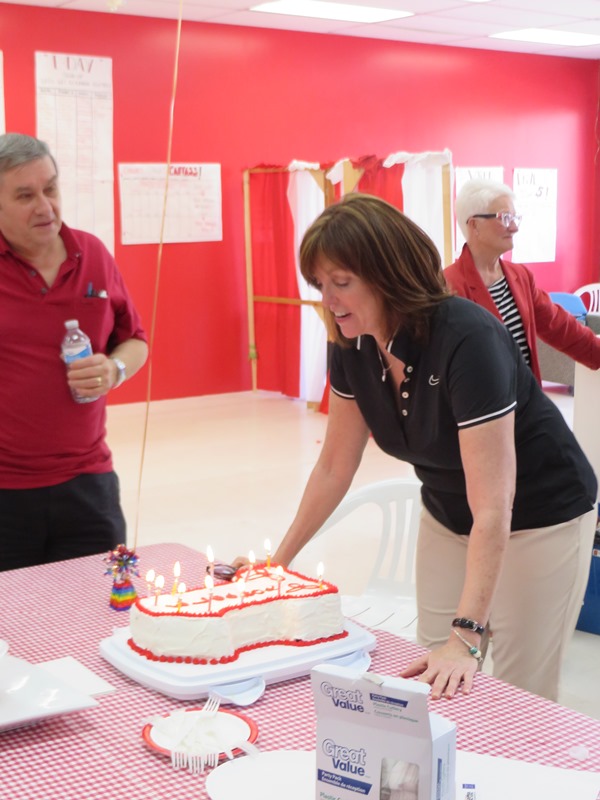 McMahon had a strong riding association that was able to get feet on the ground to do that vital door knocking – but the thinkers involved in the campaign all came from the Liberal party head office – Burlington was a seat they believed they could win. McMahon has a fine pedigree and her connections at the federal level are superb. She is on a first name basis with at least three former Prime Ministers and is a campaigner that connect with people easily. There is a humility to the woman who has core values that are more than admirable. There is nothing sleazy about the MPP for Burlington. Blessed with good health and a pleasant smile McMahon has leaned not to take herself too seriously.
She will use the next six months to get the feel of the provincial legislature and earn her stripes. By Spring of next year we will know if Eleanor McMahon is more than a pretty face.
Can she be the first in a 70 year line of Liberals for Burlington? Is there a Liberal sweep for Burlington at the federal level as well? Will the local Liberals manage to come up with a solid candidate on their own or will they have to rely on the party to sniff out a winner?

 By Ray Rivers By Ray Rivers
June 14, 2014
BURLINGTON, ON.
What a night; what an election! Ontario voters have rejected the roller coaster, recessionary, austerity program the opposition PC’s were promising. Instead we have bought into the hope, promise and reconstruction offered in the last provincial budget by Premier Kathleen Wynne. And the NDP, which had precipitated the election, ended up being marginalized.
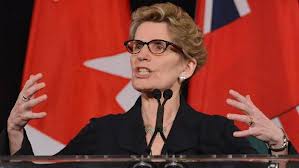 The promise was clear – not to see how well she delivers on that promise. PC leader Hudak also announced he was stepping down as leader, something which will be music to the ears of the growing number of Ontario conservatives who don’t share his ‘Tea Party north’ vision for this province. The Globe and Mail, which had been critical of Hudak’s ill-conceived election platform surprised many with its conditional endorsement of the PC leader (Tory minority). Reports indicate that the Editorial Board may have been coerced by the paper’s owners, apparently causing dissent among editorial board members and making a mockery of the claim of independence for ‘Canada’s so-called national newspaper’.
NDP leader Andrea Horwath needs to consider also stepping down, given her disappointing performance over the last year and during the campaign. Horwath falsely accused the Premier and her party of ‘corruption’. Then, having caused the election, she was inept at producing a credible platform of her own – leaving her fellow candidates and party supporters baffled and rebelling. What was clearly a cynical play to expand her party’s seat count failed miserably and cost us all – paying for an election we neither needed nor wanted.
By her unqualified victory last night Wynne has freed herself from the legacy of the McGuinty era scandals which had plagued her from her first day as Premier. Moreover she now has a mandate to lead the province onto the path she has promised would restore the provincial economy. And of course, she will need to grapple with the significant budgetary deficit still ahead as well as a debt-load inherited from the years past.
That will likely mean paying attention to the revenue side of the equation as well as the cost side. So Ontario residents should expect a return to a more equitable and fulsome taxation regime. The province has the most efficient (least cost) government in the country. So while she will need to consider ways to restrain the mushrooming size of government services, that alone will not be enough to remove us from the ‘have-not’ list of provinces.
There were other big changes in this election as well. Locally, Burlington, where I once ran, against the odds, finally went Liberal with Eleanor McMahon winning after 70 years of Tory dominance. Ted McMeekin, in Ancaster, Dundas, Flamborough and Westdale, retained his seat and can be expected to resume duties in Premier Wynne’s new Cabinet.
Halton voters put an end to the 20 years of Ted Chudleigh’s reign as Liberal Indira Naidoo-Harris pushed him out, convincingly. Chudleigh’s ouster represents the changing demographics of one of the fastest growing communities in Canada – one that he and his friend Mayor Gordon Kranz created. Can a similar fate be in the cards for Kranz this upcoming municipal election?
Premier Wynne has been given four years to implement her program of renewal and reconstruction for Ontario. This is an heroic undertaking given the global world we live in and the lack of support from a federal government best described as anti-Ontario. To be successful the Premier will need all of our support – after all we are all in this Ontario together.
Background links:
Voters Decide Liberal Win Wynne Settles the Debate Globe Editorial Board
 Ray Rivers writes weekly on both federal and provincial politics, applying his more than 25 years as a federal bureaucrat to his thinking. Rivers was a candidate for provincial office in Burlington where he ran against Cam Jackson in 1995, the year Mike Harris and the Common Sense Revolution swept the province. He developed the current policy process for the Ontario Liberal Party. Ray Rivers writes weekly on both federal and provincial politics, applying his more than 25 years as a federal bureaucrat to his thinking. Rivers was a candidate for provincial office in Burlington where he ran against Cam Jackson in 1995, the year Mike Harris and the Common Sense Revolution swept the province. He developed the current policy process for the Ontario Liberal Party.

 By Pepper Parr By Pepper Parr
June 12, 2014
BURLINGTON, ON.
It was a healthy crowd. They were attentive and at Nelson High to listen to a debate between Progressive Conservative incumbent Jane McKenna, Liberal candidate Eleanor McMahon in and Janet Mowbray representing the NDP. All want to be elected as the Burlington representative in the provincial legislature.
Other than the debate sponsored by the Canadian Federation of University Women, debate this turned out to be the only opportunity to see the candidates debating
The audience was attentive with the focus on what each political party would do for the province in terms of education.
The lines between the policies were as clear as any citizen could possibly want them to be. The Progressive Conservatives were blunt – they want to see 100,000 fewer civil servants on the public payroll which meant cuts at the educational, medical and public services levels. While cutting in these sectors was to be brutal – the promise was to create 1 million new jobs in the private sector.
The issue for the PC’s was the level of debt the province is carrying. The Liberals weren’t as constrained with debt – they saw debt as what was needed to fully recover from the 2008 recession.
The differences in the political party decisions are fundamentally clear – and we don’t hear that many people talking about a “great” program from any of them.
The New Democrats are still fighting the collective agreement battle of the 2011 election – the Liberal government of the day certainly did themselves no favours when they tinkered with the teacher’s collective agreements. Liberals now argue that the number of teachers needed problem has been fixed and that jobs were not lost – which the Tories say is part of the problem. They point to declining enrollments but nothing comparable in the way of lowering of the teaching compliment.
The Liberals believe that the only way the province is going to grow the economy – we still are not fully out of the 2008 recession – is to ensure that we have the labour force with the education needed to take up the good jobs they believe will surely come if the province stays the course.
The Tory’s are obsessed with the size of the provincial deficit and are prepared to cut, slash and burn – whatever it takes to get the civil service reduced.
The Liberals argue that cutting those education, health inspector and hospital staff will significantly reduce the quality of life and the life style Ontarians have come to expect.
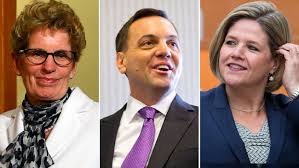 If you voted the political party – these were your choices – and the differences are stark. The campaign locally has been harder fought at the door to door level than most people realize. The Association of University Woman held their debate during which it is reported McKenna did better than the Nelson High event.
The cancellation of the Chamber of Commerce breakfast (they said no enough tickets had been sold) was a blow to the community. Many suspected the Tories in this town suggested the Chamber event be cancelled – McKenna wasn’t looking all that good at public meetings.
At some point during the campaign Cam Jackson was seen going door to door with McKenna. Those must have been really old solid Tory polls.
The brilliant cover page ad the Liberals ran in the Post stunned many. It sure looked like a real front page – but it was a paid advertorial that has McMahon sweeping the election.
Then she Toronto Star report that had Burlington going Liberal after 71 years of Tory rule- that boosted moral at the Liberal campaign office on Fairview. Some may have been surprised that the Post sold their “front” page – but a buck is a buck – I guess.
There is a time when the quality of the candidate over rides the party choice – and on that level Eleanor McMahon was the most sensitive to the issues, the most persuasive with her arguments and the most able to listen.
McKenna has been backing away from cuts in the education sector. She is reported to have said the PC’s will not be cutting education spending however she did see a need for better allocation of resources in the educational sector.
Jane McKenna has served one term as the MPP for Burlington. She was a close to last minute choice for the nomination in 2011 and was surely the most surprised and delighted woman in the city when Keith Strong approached her to accept the PC nomination.
The question many have about McKenna is: What has she done for Burlington? At a city council meeting recently ward 1 councillor Rick Craven asked why they had never once seen McKenna. “We’re paying her” was Craven’s comment “she should at least appear before us.”
Where the Liberals are weakest is with the profligate spending during the McGuinty years. There was nothing wrong conceptually with Ornge except that the government forgot they were supposed to keep an eye on what their agencies do. Where was the oversight? E-health was necessary but how did the government get hornswoggled into paying the salaries they paid?
At one point during the lead up the vote it looked as if the Liberals might have squeaked through with a slim two seat majority. That would not have been because they are the best choice – they are all disappointments and the citizens of this province deserve better.
Leadership is supposed to be about hope, promise, a better day and a better society – having “chicken little” shout at me saying the sky was going to fall in was not something I needed – thank you.
When Wynne said again and again that she was sorry about the gas plant decisions during the leaders debate I didn’t feel that we were in good hands.
That the gas plants were going to be cancelled was a given – all three parties knew that -it was the way the government sent good dollars after bad out the window as they settled with the contracting companies. The public had a right to better stewardship over public funds
At the Nelson High event candidates were given four questions prepared for the candidates taking part in the Nelson High event – they were given the questions before the event which explained why all of the candidates were reading from documents in front of them
Was it a debate? Not really but it was certainly a chance to see where each candidate and their party stood on an issue.
Other than door to door visits most of the public had not had a chance to see two of the candidates. The evening at Nelson High was an opportunity to see how much Jane McKenna had grown as a member of the legislature – unfortunately she hasn’t grown in either stature or a sense as to just what being the member of the legislature for a community is all about.
McKenna did however make it very clear what the Progressive Conservatives would do and many in the room felt the shudder of the Harris days. However, there were many that recalled all too well what Bob Rae did to the province when he was the NDP Premier.
McKenna, who is usually very quick with facts and numbers, got caught up on her some of the numbers she was putting out.
The politeness and courtesy between Liberal candidate McMahon and NDP candidate Mowbray was so distinct when compared to the brashness and hard words used by McKenna. At one point Janet Mowbray had run out of time answering a question and McMahon turned to her and said – “use some of my time. It was noted as well that every candidate for the Burlington seat was female.
For those that went to the event as hard core partisans – McKenna did fine. For those who were reflective and thoughtful – they would have left the room wondering what kind of a society they want and if McMahon represented that society. The difference between McMahon and McKenna was palpable.
A speaker brought to the audience’s attention that Mowbray was once a Liberal and did not live in the riding. McMahon was quick to point out that while she lives in Burlington her residence is about six blocks outside the constituency boundaries.
The issue for the audience was those 100,000 pink slips Progressive Conservative leader Tim Hudak has said he is going to hand out. McKenna is quick to add that much of that reduction in people on the payroll will come through attrition.
The campaign is over, people are now making their way to the polling stations and by the end of the day we will know what we have in the way of a provincial government for the next four years.
If it turns out to be Kathleen Wynne – expect her to face two different people the next time out. Hudak’s leadership will not survive another loss – and the New Democrats will begin looking for a leader who had s a plan and a vision.
Should Tim Hudak prevail and become Premier Ontario then we have to wait and see how far he goes with his plans to significantly change the way the government provides services and support to the taxpayers and how they grow the economy of the province.
Monday of next week A Different Drummer Books and Burlington Public Library will feature a guest with both knowledge and insight on just how parliamentary democracies work.
Michael MacMillan will talk about his book: Tragedy in the Commons that documents the views of former members of parliament who speak out on Canada’s Failing Democracy. Monday June 16 7pm at the Central Library.

 By Ray Rivers By Ray Rivers
May 28, 2014
BURLINGTON, ON.
Margaret Wente, a columnist for the Globe and Mail, wishes that Bill Davis were running in this provincial election because he represents “the good old days”. But Bill Davis, the Conservative, in all his fourteen years as Premier never once balanced a budget. In fact he was the kind of spender Tim Hudak daily accuses Kathleen Wynne of being.
Davis used public resources to grow the province, opening up the public treasury to improve education, infrastructure, health care, public transit, the environment and electrical energy. Davis understood that growing an economy is like growing a business, the business of good government. You need to invest and sow seeds if you want to harvest and profit. And he understood that investing for the longer term, in areas like education, is important too.
That is why I can’t support Tim Hudak. Even though we both obtained economic degrees at the same university, Hudak must have missed a few classes. I mean does he really want to be Mike Harris redux? Perhaps he is just stuck in time, given all those days he spent in the Harris caucus. Hudak’s promise to fire 100,000 teachers, nurses and civil servants has already sent shivers through the markets. And his war on trade unions would almost make Harris’s ‘Common Sense Revolution’ look like,,, common sense.
Harris learned the hard way that cutting taxes just makes the deficit bigger – which partly explains why he took so long to balance his budgets. By comparison, McGuinty’s growth program saw balanced budgets almost as often, despite the global recession which crippled our auto industry. And do we really want to further slash corporate taxes just so the big banks can make even greater profits?
Hudak’s so-called ‘million jobs plan’ has become the biggest joke in this election campaign. Wente’s reference to Hudak’s economic plan being described as “a load of ripe manure” pretty much sums it up.
And what has happened to Andrea Horwath. She turned up her nose at the kind of budget NDP’ers only dream of – the kind even Bob Rae had never introduced. Ms. Dithers, who took forever to decide to support the last budget, which gave her everything she wanted, was quick to reject this one because it offered the NDP too much. Having caused this election however, she has now decided to adopt essentially the same Liberal budget she’d just rejected as her platform.
Rank and file, and even her candidates, are disowning her. They are just as confused as she is about what she really wants. Lately and sadly, Horwath has reverted to just screaming corruption at the Premier. A false accusation since, while there may have been political pandering and some mismanagement during the McGuinty era, that is not corruption. We know that all governments, including that of good old Bill Davis, have also suffered their fair share of mismanagement and scandals.
Of course, the deficit is an issue and will need to be brought under control, and the debt paid down. But Ontario’s current debt is about the same as that of the federal government on a GDP basis, comparable by that measure to some of the other provinces and considerably lower than Quebec’s. Also, with the low interest rates we have been experiencing, debts and deficits are less of a concern, providing they are used to fund wise investments..
Had Mr. Hudak attended and paid attention to the economics classes dealing with fiscal policy, as I had, he would have learned that it is better to grow your way out of a deficit than to cripple the economy with tough austerity. The recent sad experience of European austerity is a good case study of just that. And if Mr. Hudak doesn’t believe me, he could always consult with that other economist, our PM, to learn about how growth has helped get the nation’s books out of the red.
 Energetic, engaging, open, stable and visionary. Some people think you need to change governments every couple of electoral terms, just to get a fresh start. Except that is not what the people of Alberta have been practicing for the last forty years. The ruling PC party there refreshes itself by changing its leader, usually before that leader reaches his/her best-before date. It is still democracy when you keep electing the same government, if only because the other parties are just too scary for you – as they are in this upcoming Ontario election.
Here in Ontario the PC’s once ruled continuously for 42 years with a number of different leaders at the helm. Kathleen Wynne has been Premier for a little over a year and has shown herself to be energetic, engaging, open, stable and visionary. She is as close as we get to Wente’s Bill Davis in this election.

Ray Rivers writes weekly on both federal and provincial politics, applying his more than 25 years as a federal bureaucrat to his thinking. Rivers was a candidate for provincial office in Burlington where he ran against Cam Jackson in 1995, the year Mike Harris and the Common Sense Revolution swept the province. He developed the current policy process for the Ontario Liberal Party.
Background links:
Wente on ghosts haunting Ontario
Bill Davis
Balanced Budgets
Alberta’s Elections
Tractor Pull
The NDP (Caplan)
Horwath’s Platform
Horwath’s Problems
Hudak’s Economics
Hudak (Caplan)
Hudak’s Million
Hudak’s Math

 By Ray Rivers By Ray Rivers
May 22, 2014
BURLINGTON, ON.
It was 1962 and the world was in the grip of the Cuban Missile Crisis. Fidel Castro was a rag-tag revolutionary, determined to nationalize American companies in his Cuba, regardless of Yankee pressure. It didn’t take long for Washington to pass judgement on this cigar chomping, bearded upstart – he was a ‘commie’ and was to be spurned. And so, as if in a self-fulfilling prophecy, he was pushed into the welcoming bear-hug of a Soviet Union looking for friends with real estate on America’s backdoor.
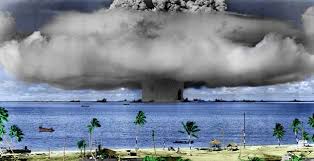 That mushroom cloud from a Pacific Island test site has become the symbol of terror – in the wrong hands – terror would reign. In 1962, Kruschev accepted Castro’s offer to locate nuclear warheads on the island, though he kept the keys in Moscow. Once JFK was shown the evidence he engaged the world in a dangerous waltz with the Soviet leader. But in the end ‘The Russians tried. the Russians failed – homeward bound those missiles sailed’ (Phil Ochs). In return, the US agreed not to invade Cuba and to dismantle some obsolescent missiles in Turkey.
The Ukraine had been the third largest nuclear power in the world before they decided to destroy their weapons and sign onto the nuclear non-proliferation treaty (NPT). That was a bold act for which they demanded and got a quid-pro-quo as Russia, USA and UK put their signatures on 1994 Budapest Treaty guaranteeing Ukrainian’s territorial integrity and preserving it from foreign aggression.
Well we all know how that worked out. The US and UK turned their blind eyes as Mr. Putin marched in and swallowed Crimea. So emboldened was the Russian leader by this act of treachery, that he adopted the very same tactics into his play for eastern Ukraine. It turns out the Budapest Treaty isn’t worth the paper it was written on.
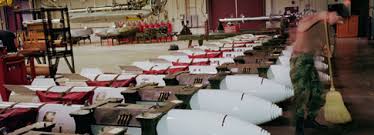 Stock pile of nuclear weapons. No one really knows how many of the things tehre are in the world – too many, Still, there is no question where this story leads, as Russia shows no sign of stopping its subversion and planned absorption of part or all of Ukraine into the new Russian empire. And the US and UK have no intention of lifting their hands in any meaningful way to help, other than the couple of finger jabs they call sanctions. Though there is an election in a few days and that may resolve or rekindle the chaos currently gripping the country.
Ukrainians are Slavic people which originates from the word slave. And that pretty much sums up what happens to passive nations which actually believe in peace. Watching the early events evolve in eastern Ukraine was a bit like reading a Ukrainian version of the 1936 children’s book, ‘The Story of Ferdinand’. Banned by Franco, burned by Hitler, restricted by Stalin but cherished by Mahatma Gandhi, it is the tale about a bull who would rather smell the flowers than fight in the ring. That seems to be a passing story, however, as the Ukrainian military finds its momentum.
Cuba prevented American invasion by threatening potentially deadly nuclear retaliation to rain down on Washington. Would that strategy also work to now protect the Ukraine? Would American or British nuclear missiles sited in Ukraine, close enough to evade Russian defensive systems, and capable of turning Moscow into a bowl of bubbling borscht,deter further Russian aggression. Or would it just hasten the end for all of us.
To be sure the most disturbing aspect of this whole Ukrainian mess is the nonchalance of Obama and Cameron, global leaders who upon inheriting an international treaty to protect Ukraine, have no intention of living up to it. Ukraine would not have given up its nuclear arsenal without the assurances it got to preserve its territorial integrity. And nuclear weapons have become the ultimate defence mechanism – the very reason Obama and the Cameron won’t seriously confront Russia.
So, is that the lesson for the rest of the world? Nobody else is going to protect you from these new renaissance warriors – so you better get yourself a nuke. Does flaunting or outright breaking of international treaties, protocols and laws have no consequences? Are we witnessing the death knell of globalization as new trade restrictions, sanctions, and border controls bring the hope of global free trade to an end?
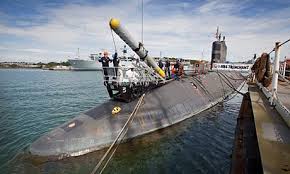 Any nation with a coast line and a submarine can transport its weapons anywhere in the world. Background links:
Ukrainian Nukes Canada on Ukraine Putin VS Hitler The USSR
Cuban Missile Crisis Cuban Revolution Nuclear Disarmament

 By Pepper Parr By Pepper Parr
May 19, 2014
BURLINGTON, ON.
We wrote a piece based on what we were told by our readers; ordinary people with strong convictions and a desire to get all the facts on the table.
Different readers had different search experiences (isn’t technology great?) for news about the Air Park which is a hot topic for people in Burlington.
The first hint we got was that everything about the air park had disappeared from the insidehalton web site was this: “I have been tracking for any coverage on the Burlington Airpark / Airport on Metro Media site (Spec and insideHalton) for some time. This weekend, all past articles on the Airpark have disappeared (there used to be a number of articles), and the return message shows that no search result found. What gives?”
That user got back to us with: , “I will continue to perform the search every day…“burlington airpark” airport on the whole Spec / Metro Media site. My searches today give me the following message…
We were unable to find results for “burlington airpark” in Burlington
That was followed by a comment from a reader who said everything after 2013 was no longer on the site.
That was followed by a comment from a reader who seemed to get a little panicky: “The article that Tina Depko-Denver won her recent award for (best rural story in Ontario community paper) no longer comes up on searches. This is freaking me right out.
“Here’s the link to the artcile (that I had to re-find via twitter) – see if you can find it by searching on insideHalton. https://m.insidehalton.com/news-story/3844524-airpark-neighbours-call-on-government-for-help/
That was followed by: “It came up for me.”
That was followed by this:
“The articles are all there…they come up in different order – by date or relevance – based on how you search for them.
“I get a different list based on how I search: searching by “rossi” as in Vince pulls up some, searching by “warren” as in Vanessa pulls them up in a different order of “relevance.”
“The best search is by “Burlington Executive Airport” it pulled up the most comprehensive list. It has them mostly sorted by date – since the article “neighbours call on government for help” as almost a year ago, it will appear lower down on the list, on page two.
“Here’s the list with that search function enabled:
https://www.insidehalton.com/search/news/?q=burlington%20executive%20airport&location=halton&sort=rel
Here are just some of the articles I found on the website dealing with the airpark.
https://www.insidehalton.com/news-story/4417902-appeal-date-set-for-burlington-airpark-case/
https://www.insidehalton.com/news-story/4220726-burlington-airpark-launches-appeal-of-landfill-ruling/
https://www.insidehalton.com/news-story/4219079-burlington-wins-airpark-landfill-dispute/
https://www.insidehalton.com/news-story/4252426-airpark-paying-city-40k-for-legal-fees/
https://www.insidehalton.com/news-story/3839981-neighbours-of-burlington-airport-complain-of-ongoing-fill-activity/
https://www.insidehalton.com/news-story/3907517-burlington-airport-city-hall-seeking-court-injunctions/
https://www.insidehalton.com/news-story/3870812-leaders-speak-out-against-burlington-airport-expansion/
https://www.insidehalton.com/news-story/3844524-airpark-neighbours-call-on-government-for-help/
“I think this is a question of digital technology: what search words are being used, and the search tool pulling up information based on chronology and relevance.”
The Gazette has been very deliberate in not using the names of people who send in comments. The libel chill is still in the air.
It would appear that the information on the insidehalton web site is still in place. Finding it requires one to use the most effective search terms. Should it be easier? We suppose so but one cannot blame the people who run the insidehalton web site for the search terms their readers use.
It is all their and we expect it will continue to remain on the site. We had planned on trying to reach the operators of the insidehalton site – but the holiday schedule meant no one was picking up their telephones.
We were perhaps a little too quick to call shame on the Metromedia papers and for that we apologize. There are a lot of frightened people in Burlington – and they have every reason to be frightened.
Background links:
The first we heard of editorial material disappearing.
Air Park legal counsel sending out libel notices

|
|
 By Ray Rivers
By Ray Rivers Yet Canadian aboriginal and government officials had been engaged in the development of this declaration since the 1970’s. Amnesty International, condemned the Conservative government’s position as they argued that the UNDRIP outlined minimum human rights standards, complementing rather than overriding existing rights. In fact, over a hundred Canadian lawyers and legal experts prepared an open letter outlining why the Canadian government’s claims were misleading.
Yet Canadian aboriginal and government officials had been engaged in the development of this declaration since the 1970’s. Amnesty International, condemned the Conservative government’s position as they argued that the UNDRIP outlined minimum human rights standards, complementing rather than overriding existing rights. In fact, over a hundred Canadian lawyers and legal experts prepared an open letter outlining why the Canadian government’s claims were misleading. Pierre Trudeau, in 1969, and Stephen Harper, more recently, learned that change is not something government can do on its own, it needs to engage all Canadians in a serious discussion. Boundaries and limits, as articulated in the old treaties, can both protect and imprison. Would the creation of aboriginal nations within the Canadian nation be a solution? Doesn’t that already exist with the system of reserves? Would that have served to prevent the conflicts at Caledonia, Ipperwash, Akwesasne and ‘Idle No More’?
Pierre Trudeau, in 1969, and Stephen Harper, more recently, learned that change is not something government can do on its own, it needs to engage all Canadians in a serious discussion. Boundaries and limits, as articulated in the old treaties, can both protect and imprison. Would the creation of aboriginal nations within the Canadian nation be a solution? Doesn’t that already exist with the system of reserves? Would that have served to prevent the conflicts at Caledonia, Ipperwash, Akwesasne and ‘Idle No More’? There are no elegant solutions it seems, but the status quo is unsustainable, and we are not even talking about the real issues – the longer term place of aboriginals and their culture in Canada and among the rest of Canadians. We dance about, dealing with symptoms like the land claims or improving the education and health services on the reserves, as the Kelowna Accord was intended to do – good things nonetheless. And we pretend to worry about offending native culture, such as when a celebrity dons a warrior headdress, though like the feathered bonnet, so much of all of this is clouded in symbolism.
There are no elegant solutions it seems, but the status quo is unsustainable, and we are not even talking about the real issues – the longer term place of aboriginals and their culture in Canada and among the rest of Canadians. We dance about, dealing with symptoms like the land claims or improving the education and health services on the reserves, as the Kelowna Accord was intended to do – good things nonetheless. And we pretend to worry about offending native culture, such as when a celebrity dons a warrior headdress, though like the feathered bonnet, so much of all of this is clouded in symbolism. Ray Rivers writes weekly on both federal and provincial politics, applying his more than 25 years as a federal bureaucrat to his thinking. Rivers was a candidate for provincial office in Burlington where he ran against Cam Jackson in 1995, the year Mike Harris and the Common Sense Revolution swept the province.
Ray Rivers writes weekly on both federal and provincial politics, applying his more than 25 years as a federal bureaucrat to his thinking. Rivers was a candidate for provincial office in Burlington where he ran against Cam Jackson in 1995, the year Mike Harris and the Common Sense Revolution swept the province.













 In fact, Canada has been criticized by the UN for its aboriginal policies, and with some legitimacy. One needs to only look at incarceration rates in Saskatchewan and Manitoba to see that there are problems. And, then there are all the other issues: inferior education, missing women from reserves, violence, alcohol and drug abuse, increasing obesity rates and racial discrimination that still occurs in parts of the country.
In fact, Canada has been criticized by the UN for its aboriginal policies, and with some legitimacy. One needs to only look at incarceration rates in Saskatchewan and Manitoba to see that there are problems. And, then there are all the other issues: inferior education, missing women from reserves, violence, alcohol and drug abuse, increasing obesity rates and racial discrimination that still occurs in parts of the country. Suffice it to say that there have been some positive amendments to the Act over the years, allowing status Indians the right to vote and eliminating discrimination against women who choose to marry outside their tribe. The process of ‘enfranchisement’, or ‘civilizing’, which gave us the horrific experience of residential schools, has mostly been brought to an end. In addition there has been progress on land claims. This topic is a complex web of issues to unweave, so please stay tuned for another column.
Suffice it to say that there have been some positive amendments to the Act over the years, allowing status Indians the right to vote and eliminating discrimination against women who choose to marry outside their tribe. The process of ‘enfranchisement’, or ‘civilizing’, which gave us the horrific experience of residential schools, has mostly been brought to an end. In addition there has been progress on land claims. This topic is a complex web of issues to unweave, so please stay tuned for another column.


 Well it is because so many seniors end up retiring and dying in poverty. The CPP is currently paying an average of less than $7,000 a year. It fails to provide even a decent minimal level of income for retirement. And even with the OAS dollars thrown in, a pensioner would be living below the poverty line unless he/she had a company pension plan, RRSP, other savings or a house.
Well it is because so many seniors end up retiring and dying in poverty. The CPP is currently paying an average of less than $7,000 a year. It fails to provide even a decent minimal level of income for retirement. And even with the OAS dollars thrown in, a pensioner would be living below the poverty line unless he/she had a company pension plan, RRSP, other savings or a house.





 Mr. MacKay calls his new legal framework made-in-Canada, but it really just mimics the so-called Nordic model which most researchers on the topic admit is a hopeless failure at either eliminating prostitution or reducing potential violence.
Mr. MacKay calls his new legal framework made-in-Canada, but it really just mimics the so-called Nordic model which most researchers on the topic admit is a hopeless failure at either eliminating prostitution or reducing potential violence.




 By Ray Rivers
By Ray Rivers


 By Pepper Parr
By Pepper Parr




 ne 20, 2014
ne 20, 2014
















